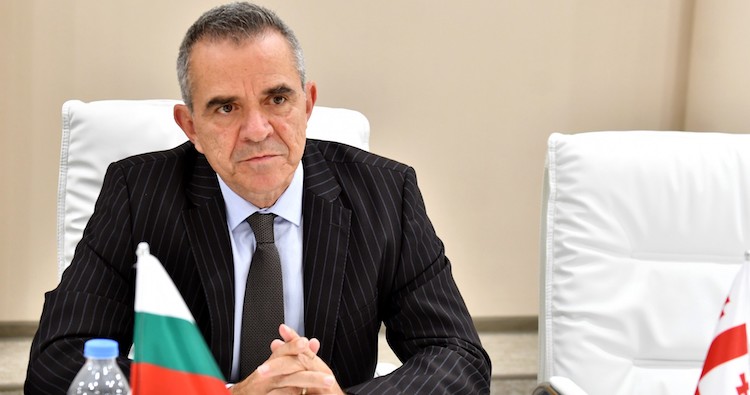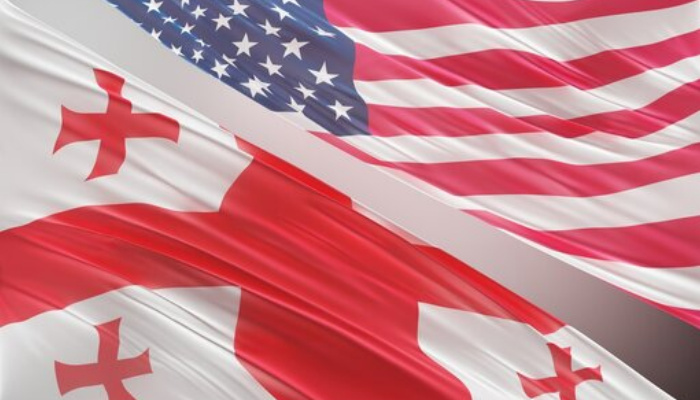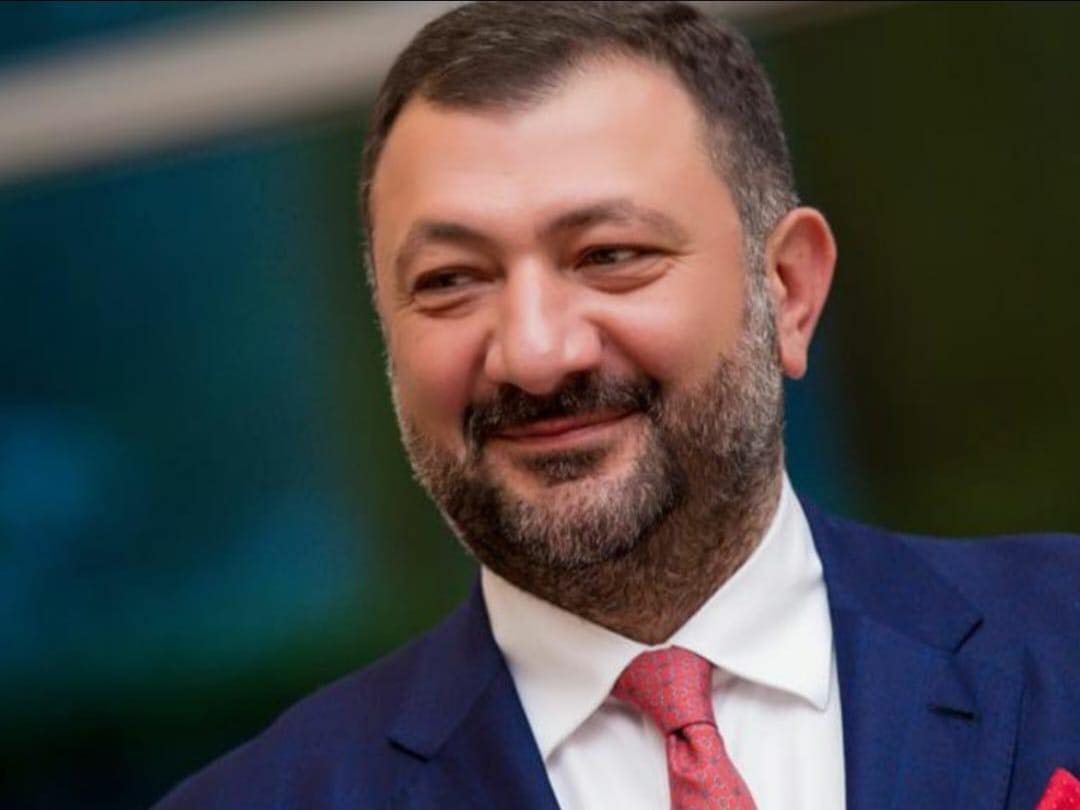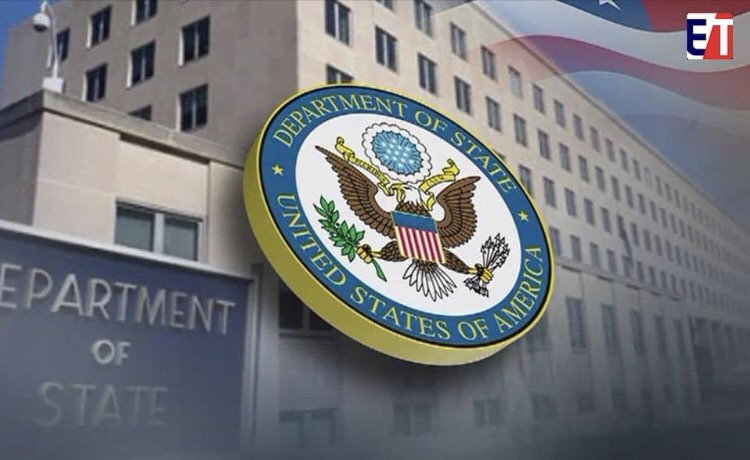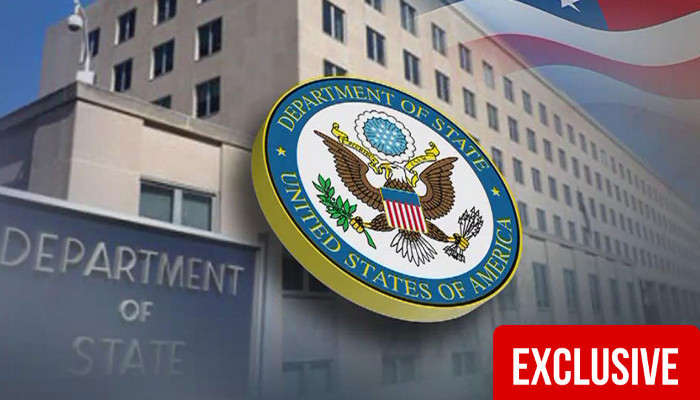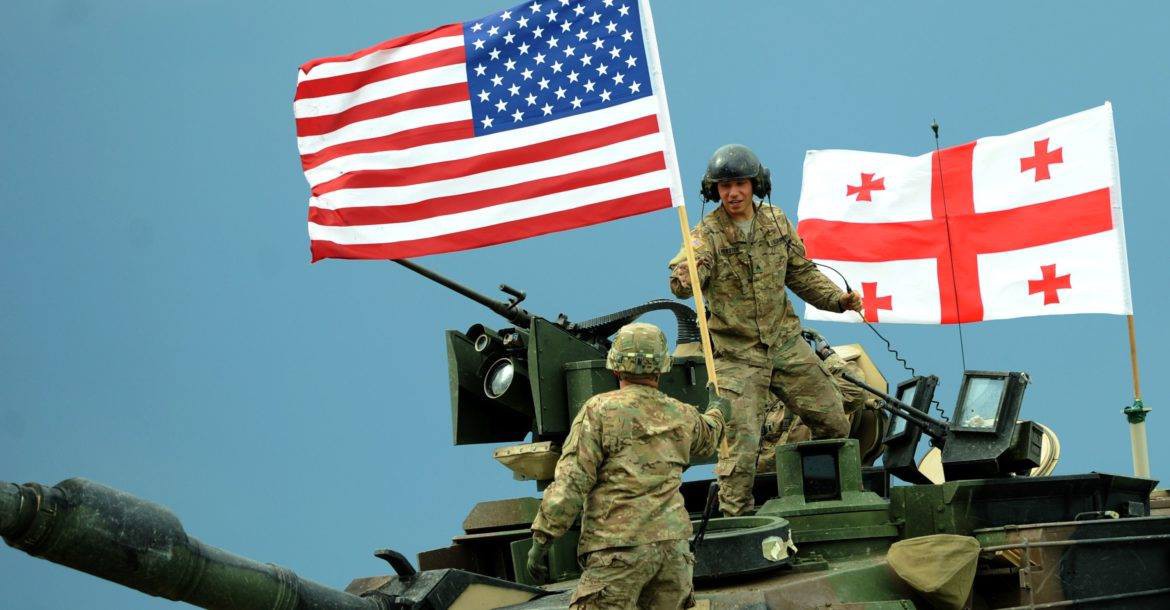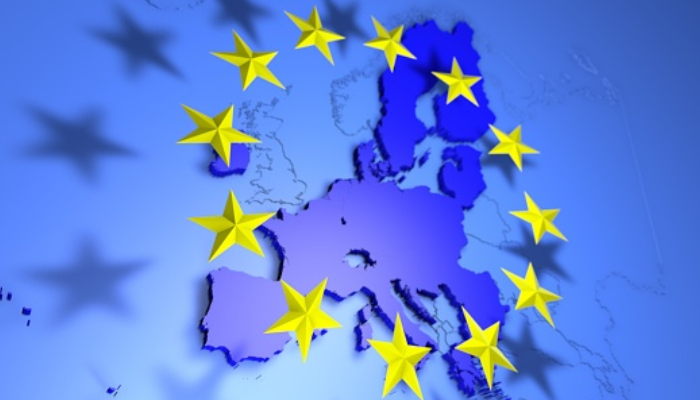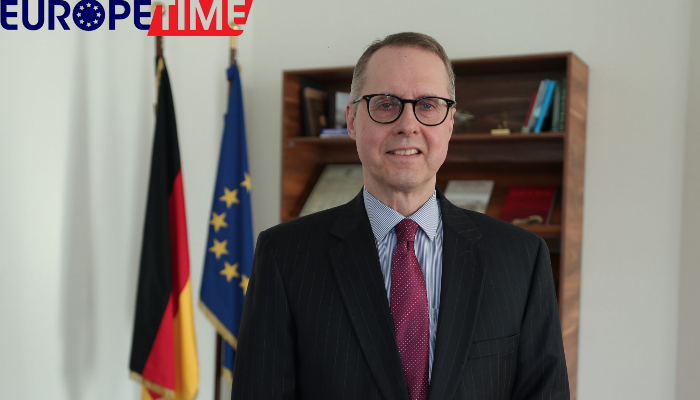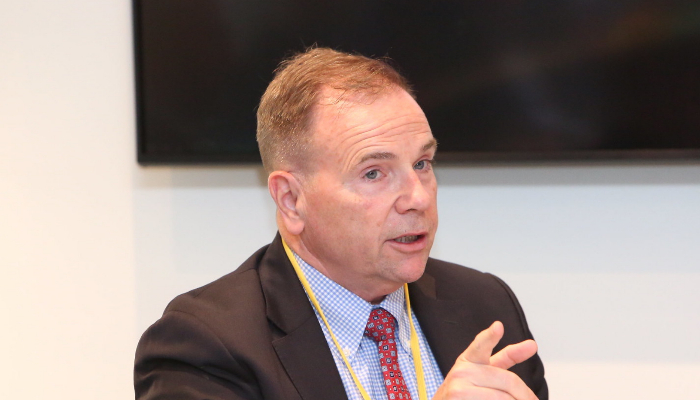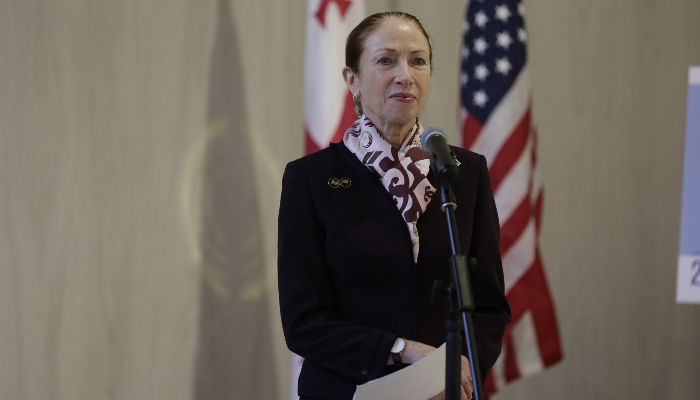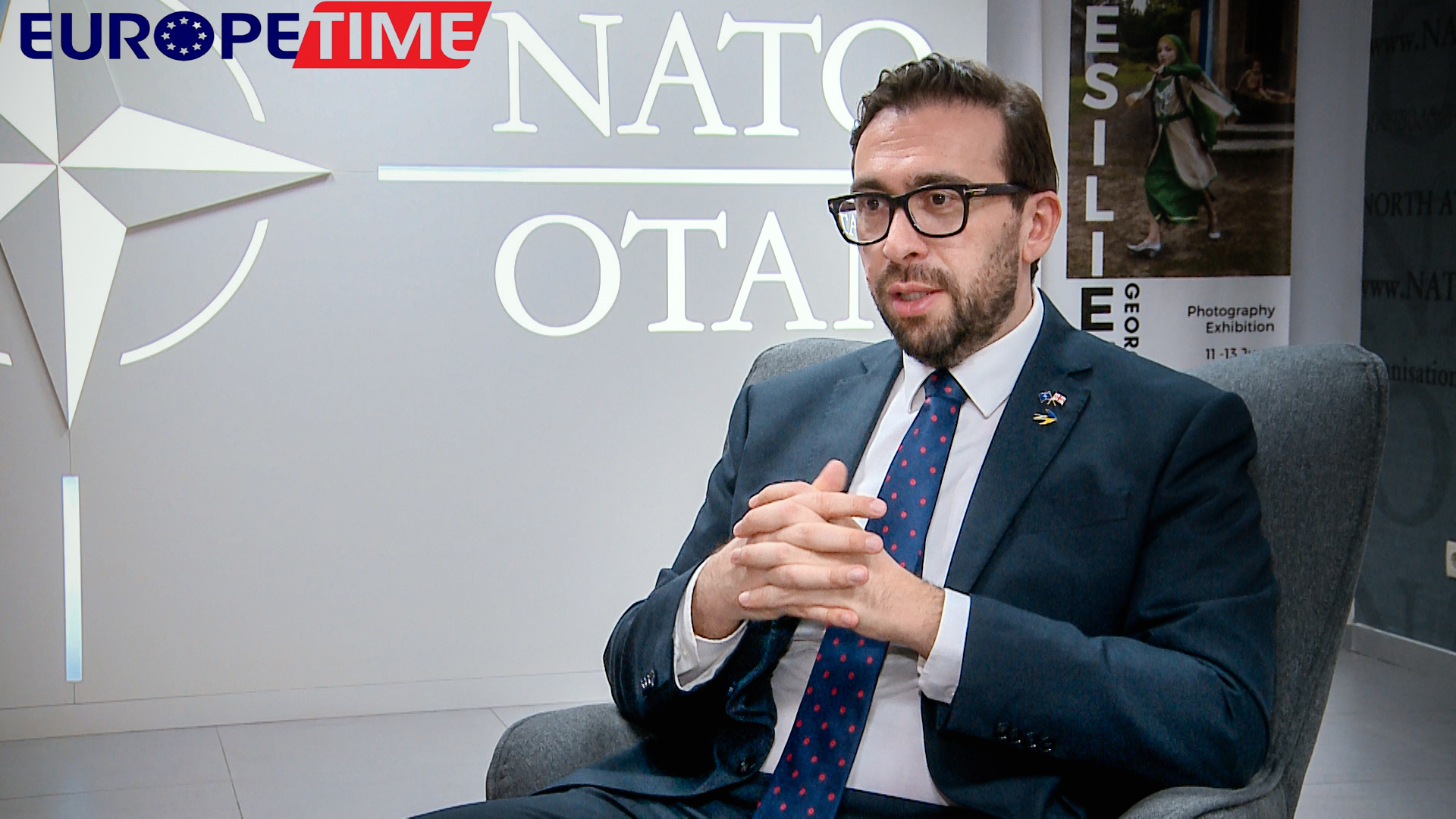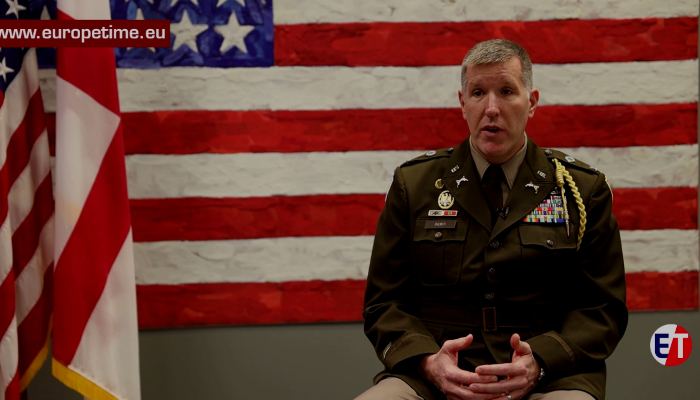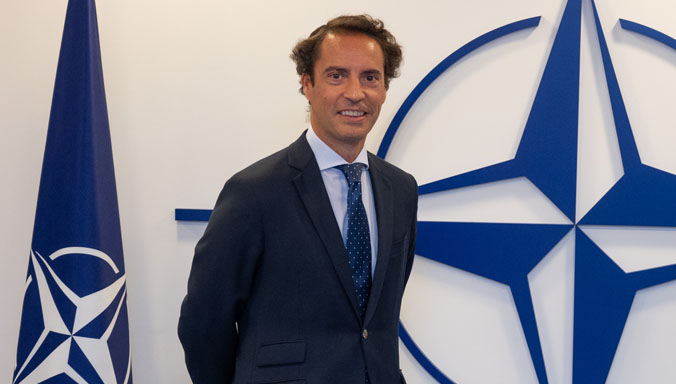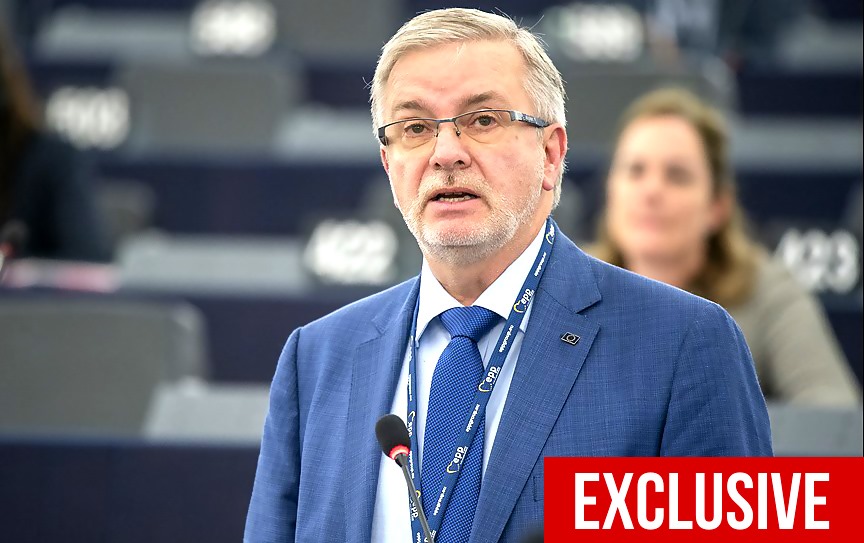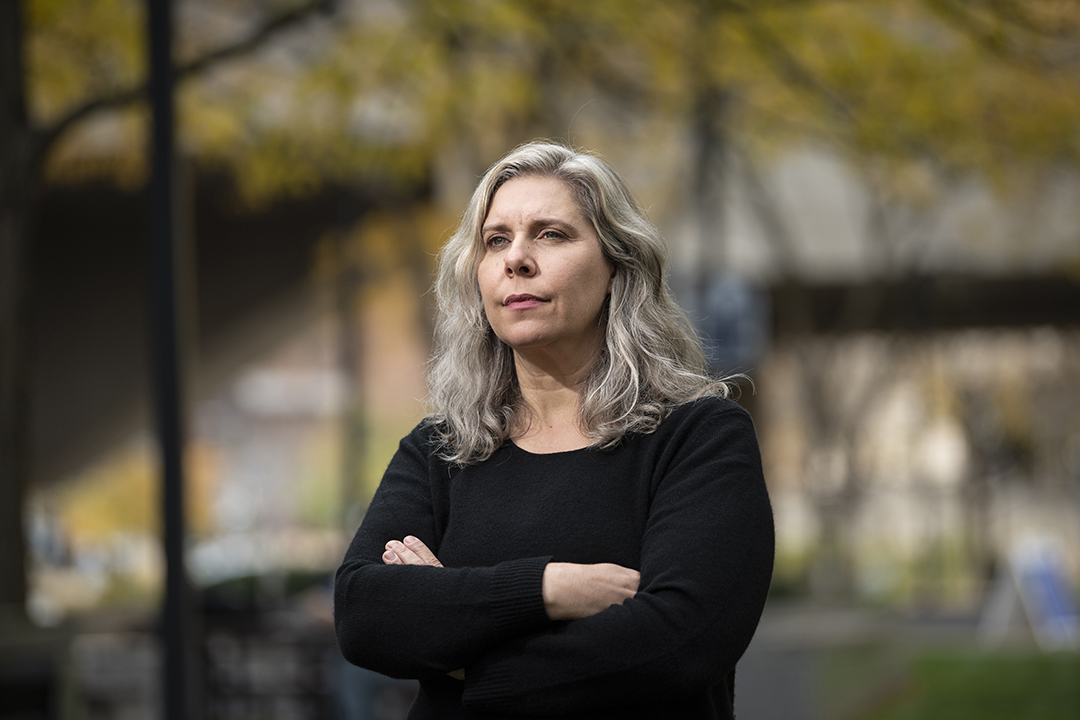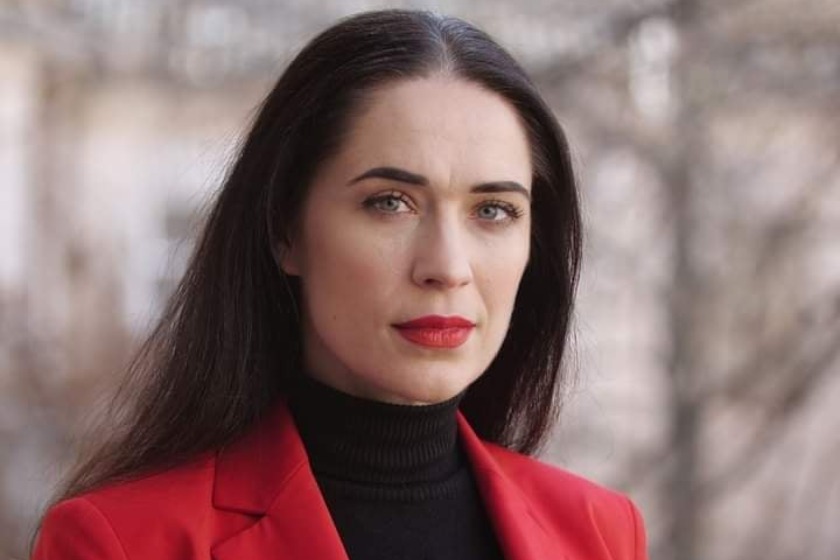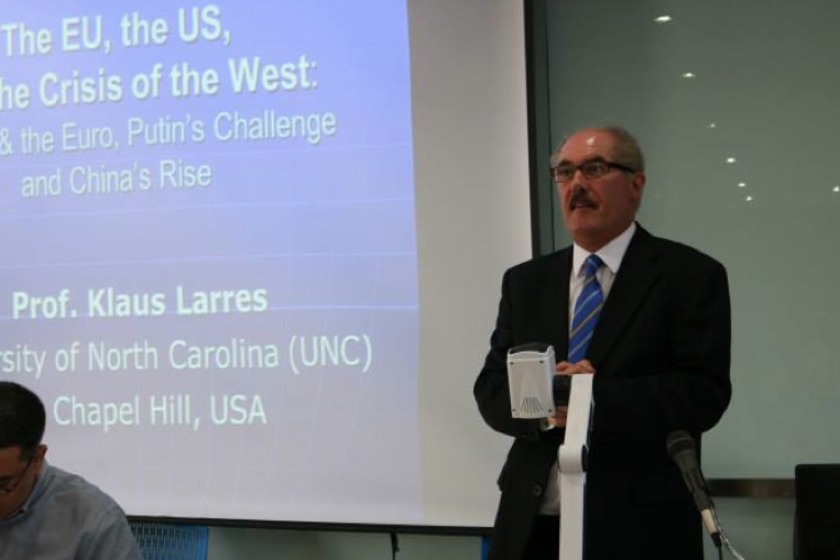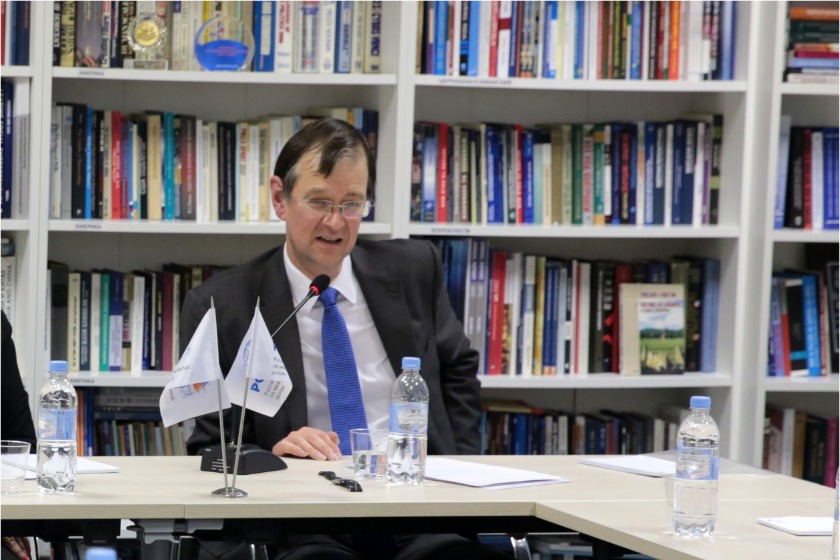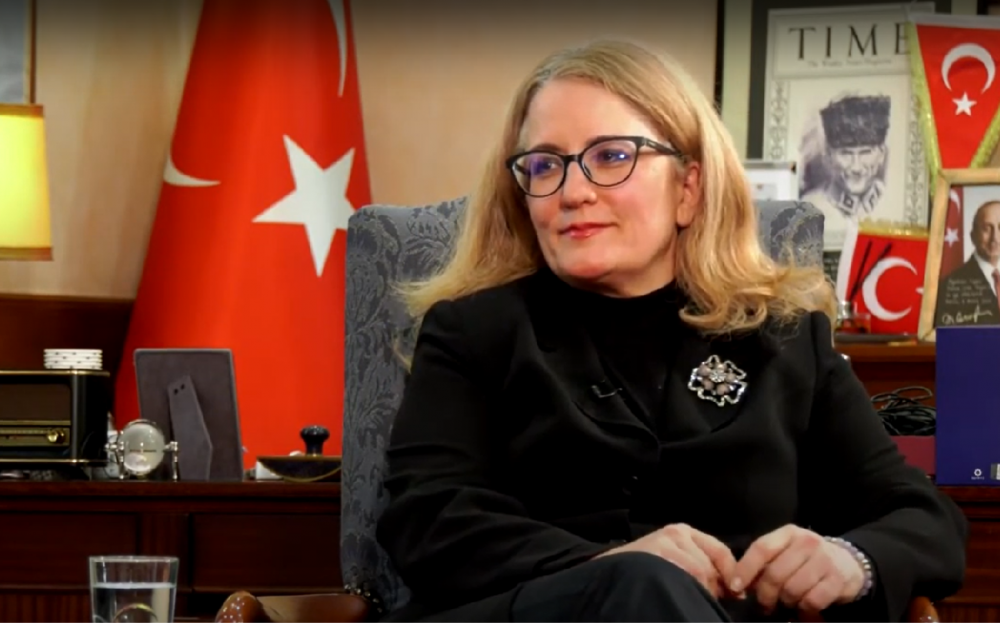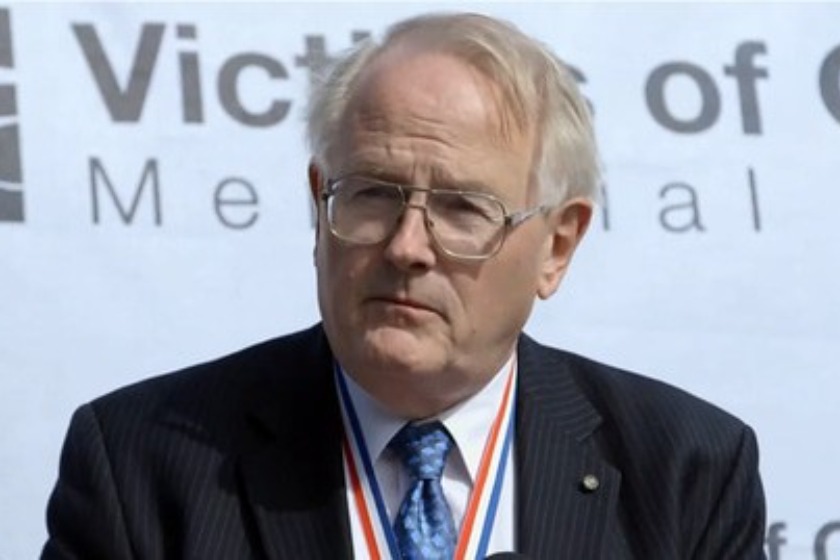Interview
Bulgarian Ambassador: After an agreement on the resumption of ferry traffic is signed, more concrete and cooperative action is needed
Bulgaria is interested in expanding the infrastructure link between Europe and Asia, particularly in the direction of implementing projects of shared interest in the fields of energy, transportation, and communication, according to Veselin Valkanov, the ambassador of Bulgaria to Georgia, in response to a question from Europetime. In light of this, the ambassador reacts to the agreement to resume ferry service between Georgia and Bulgaria by stating that more substantial action ought to occur after the agreement is signed. „Bulgaria is very keen on developing the infrastructure connectivity between Europe and Asia, especially in the implementation of projects of common interest in the fields of energy, transport, and communications. This very much coincides with our desire to raise our friendly relations and cooperation with Georgia, our neighbour across the Black Sea. The growing importance of this part of the world for our development and prosperity also demands action from us to make the best of the opportunities that are coming about with the Trans-Caspian International Route and the Middle Corridor. It is in the light of the above that I see the signing of the agreement on the restoration of ferry traffic on the Black Sea. Just a side note: there has been a ferry connection between Bulgaria and Georgia for more than 45 years. Maritime transport, when used efficiently, has numerous advantages. Trade flows are there waiting to be handled, and goods and cargo are to be delivered in a reliable, more environmentally friendly, and less costly way. The ferry traffic falls into this category, but for it to live up to expectations and be profitable, we need sufficient freight in both directions: west-west-east and east-west. Therefore, the signing of the said agreement needs to be followed by more concrete and cooperative action. All accumulated and available experience and know-how, e.g., from TRACECA, needs to be used efficiently. Coordination, logistics, and digitalisation of services, their simplification, modernisation, and speeding up will all contribute to better results and open a wider way forthe trade flows coming from China and Central Asia to reach the EU. All countries along the route stand to gain from this and should make the necessary efforts to turn opportunities into real gains for their populations. The Bulgarian side is ready and willing to take this cooperation with Georgia and the other partners forward,“ Vesselin Valkanov said. Some Background An agreement on the resumption of ferry traffic was signed between the Georgian Railway, the Bulgarian Railway and the Bulgarian shipping company. The parties have agreed on all conditions of mutual cooperation in order to restore the proper functioning of the railway ferry. Ferry/railway services have been suspended for the past two years.
Exclusive Interview: The United States has long been a strong supporter of the Anaklia deep-sea port, a US official says
US-Georgia's strategic partnership; U.S. efforts regarding democracy in Georgia; Euro-Atlantic aspirations; security of Georgia in the context of the Black Sea; NATO; economy of Georgia in the context of trade through the Anaklia port; Middle Corridor—a US State Department official discussed these and other subjects under the condition of anonymity in an exclusive interview for Europetime. US-Georgia's strategic partnership According to a US official, “the bilateral partnership between the United States and Georgia is good. The United States has been the strongest supporter of Georgia`s economic and democratic development and prosperity over the last 31 years.“ “So I think we are going to continue to partner with the people and the government of Georgia as they pursue a democratic, prosperous, peaceful, and Euro-Atlantic future. Congratulations to Georgia, the people of Georgia, and the government European Commission recommendations—that is a great sign and tremendous opportunity for all Georgians, and I think it is just another sign that this shows the path towards continuing partnership that the United States and Georgia have. We saw the excitement in the streets of Tbilisi over the EU decision that was shared here, in Washington, by those who love Georgia. I think it really shows that if we work together, if the political parties work together, and if the parliament and government work together, we really have exciting possibilities for our future,“ a US official told EuropeTime. U.S. efforts regarding democracy in Georgia As for the U.S. efforts regarding democracy in Georgia, elections are approaching, and very important information has been spread recently, according to which the U.S. government has and will continue to expose Russia’s efforts to undermine democratic elections around the world. How large-scale is this threat to Georgia, and how will the US support ensuring transparent elections in Georgia? This is a crucial question for the US, a US official says. „This is an incredibly important question for the US because, when we are talking about the EU commission's recommendation to grant Georgia candidate status, free and fair elections were one of the main requirements. We will continue to work with Georgia's Central Election Commission and international partners, including the OSCE and the Council of Europe, to ensure long-term observation needs. Russia is seeking to subvert democratic processes around the world, not only in Georgia but around the world. We are raising awareness that, as part of these efforts, Russia is pursuing operations to degrade public confidence in the integrity of elections themselves. To better understand this threat, the U.S. Intelligence Community undertook a review of Russian operations to undermine public confidence in democratic elections that took place between January 2020 and December 2022. The IC found that this Russian activity is global in scope. Russia is seeking to undermine democracies from within. In response, the U.S. State Department has briefed more than 100 democracies around the world on these Russian efforts and steps we can take together in response. We are also speaking openly about these findings. We have and will continue to expose Russia’s efforts to undermine democratic elections around the world. We will also continue to work with other democracies to further these efforts. We are seeking to increase public awareness of and resilience against these Russian activities. We had discussions with Georgia about the Russian efforts,“ a US official told EuropeTime. Regarding the following actions, according to a US official, the next most important step really is to start working on long- and short-term monitoring of the elections. “This is the right time for us to be working with the central election commission, working with the partners, civil society, and making sure that, in partnership with Georgia, we can do what we can to make sure that these are successful elections, because this will be especially important given the recommendation by the European Union. It is really important that these elections go forward in a proper way.“ Euro-Atlantic aspirations, NATO According to Washington, the declarations of the Bucharest summit in 2008 made it clear that Georgia would become a member of NATO. According to Washington, Georgia is a steadfast NATO Enhanced Opportunities Partner, a category reserved for NATO’s closest partners. „Georgia has had NATO aspirations for a long time. In 2008, the Bucharest summit declarations revealed that one day Georgia would become a member of NATO. I think that Georgia is a steadfast NATO Enhanced Opportunities Partner, a category reserved for NATO’s closest partners, and has served alongside American and other NATO troops. The United States is a strong supporter of Georgia’s NATO aspirations. The United States continues to work with Georgia on building its interoperability with NATO, and we urge Georgian officials to advance the vital democratic reforms that are essential for NATO admission because, even though NATO is a security organization, there are also, in many ways, political aspects,“ a US official told EuropeTime. Anaklia deep-sea port The United States has long supported Georgia’s economic development and recognizes the key role Georgia can play in the Middle Corridor with its access to the Black Sea. “The United States has long been a strong supporter of Anaklia's deep water port development because it is a very important contributor to Georgia's economy for the development of the Trans-Kaspian transportation corridor. What we have seen is the great importance of developing the middle corridor to allow goods to go from central Asia through the Caucasus to Europe and really help economic integration and development in all these regions. So, we think further developing the port will be a really important element in economic development. It is the sovereign decision of the Georgian government to develop the port, but what we, the United States, are looking for is a project that is transparent, in accordance with the rule of law, that really takes into account the long-term security and prosperity of Georgian citizens—the projects that are done in a transparent way and that pay attention to the interests of the Georgian citizens. Any of these types of projects are good. I would encourage Georgian people and the Georgian government to consider those types of projects.“ The security of Georgia in the context of the Black Sea and Russia`s war in Ukraine In the context of the security of the Black Sea region, what role and importance does Georgia have, and what should Georgia do in order to further increase and strengthen this importance and role? An important component in this war is the Black Sea. The Russians announced the creation of a new Black Sea Fleet base in the occupied territory of Georgia. Against the backdrop of Russia's actions, how does the US see the prospect of long-term security in the region in general and Europe as a whole, including Georgia? In response, a senior US State Department official emphasizes the importance of continuing to work with allies and partners. “We have Russia`s brutal war against Ukraine; 20 percent of Georgia`s territory is occupied by Russia. All these things really demonstrate the critical strategic importance of the Black Sea region. So, what we have done is continue to encourage deeper cooperation among Black Sea allies and partners to deter and defend against Russia`s ongoing aggression in the broader Black Sea region. This cooperation includes further efforts to increase information sharing to build common awareness in the maritime domain and beyond. So, we want to cooperate with the Georgian government as a close bilateral strategic partner in the region and as a NATO partner for peace because we are looking to help develop Georgia`s capacity and capability to deter and defend against any kind of aggression, including in the Black Sea.The United States remains a steadfast supporter of the territorial integrity and sovereignty of Georgia within its internationally recognized border. Russia's plans to establish a permanent naval base in occupied Abkhazia are deeply concerning. Such an act will be another clear violation of the commitment Russia made under the 2008 cease-fire agreement to withdraw its forces to pre-conflict positions. So any such actions by Russia will further increase tensions and undermine stability in the region,“ a US official told EuropeTime. Armenia-Azerbaijan Washington admits that it is not satisfied with what happened in Nagorno-Karabakh. They stress how crucial it is to resume the peace talks. Washington believes that the statements of the assistant Secretary of State for European and Eurasian Affairs, James O'Brien, reflect the best way to ensure security in the region. Washington supports O'Brien's position amid Baku protests. “We are not happy with what happened in Nagorno Kharabakh. It is important to get back to peace talks. James O’Brien, Assistant Secretary at the U.S. Department of State’s Bureau of European and Eurasian Affairs, reiterated this during a congressional hearing on Wednesday. His talks are the way to long-lasting security for both Armenia and Azerbaijan, and, frankly, to Georgia`s benefit as well. The best way to develop and expand is if we can actually have peace between these two countries. This is something we will continue to work on, and I am optimistic we will be able to get back to peace talks and hopefully will be able to start building a better south Caucasus for all countries because stability is good not only for Armenia and Azerbaijan but for Georgia as well, for security reasons, economic development reasons, democracy, and transparency reasons,“ a US official told Europetime.
Batumi multimodal terminal - a new opportunity on the route connecting Europe and Asia
Well-known Kazakh media publications “Elitar.kz” and “Kazakh. Inform” published an interview with Mamuka Murjikneli, General Director of Batumi Multimodal Terminal, which refers to the development of the Middle Corridor. As the journalist notes, the Batumi Multimodal Terminal is one of the most important on the road connecting Asia and Europe and is considered a strategic factor, and the proof of this is cited by the visit of the Prime Minister of Uzbekistan to the Multimodal Terminal in Batumi, as well as the fact that the terminal was created and functions with the synergy of Asian-American-Georgian partnership and cooperation. The interview's translation is provided by Europetime. The new geopolitical conditions in the region have changed many things and made the role of transit countries even more prominent and important. In this context, the role of Kazakhstan is very important. During the visit of the Prime Minister of Kazakhstan Alikhan Ismailov to Georgia, one of the main topics was the importance and role of the Trans-Caspian international transport route. During a meeting with his colleague, the Prime Minister, the deepening of strategic cooperation between the two countries was emphasized, and especially the importance of the “Middle Corridor” initiative, which includes Azerbaijan, Georgia, Kazakhstan and which is aimed at increasing the attractiveness of this route for cargo transportation. The corridor will connect Central Asia, China and other Asian countries to Europe. A five-year road map has been developed outlining the responsibilities of each country until 2027. Considering all this, we think that our readers will be interested in an interview with Mr. Mamuka Murdzhiknel, General Director of the Batumi Multimodal Terminal in Georgia. Mr. Mamuka, if you can tell us a few words about the multimodal terminal, we know that the construction of the terminal did not stop even during the pandemic period and today it is already operating at full capacity. The necessity and purposefulness of these steps and the construction of the terminal as a whole, as can be seen from today’s point of view, was correctly seen, analyzed and assessed by your company. First of all, thank you for the interview and interest. Our company Wondernet Express Investment Group started the construction of the Batumi multimodal terminal in 2018, completed it in 2021, and today the terminal is operating at full capacity. The leading European design institutes and the world's largest suppliers of shipping and warehouse equipment took part in the development of the specified project. The terminal is fully automated and includes conveyor belt systems and a ship loader. It is equipped with modern equipment necessary for reloading mineral fertilizers, the latest filtration technology, and the terminal will be able to process up to 1,500,000 tons of fertilizers per year. Our partner is the American, largest trading corporation Trammo. We represent a symbiosis of Georgian-Uzbek-American investments and interests, which is very important and has strategic importance today. The main cargo we handle at this stage is urea, although our terminal's technical equipment and standards allow us to handle other mineral fertilizers as well. Receiving cargo at our terminal is carried out in a completely closed premises, as well as its storage and subsequent transfer to the vessel. We have a belt conveyor system, which means that we automatically transfer the cargo from the wagon to the warehouse and from there load it directly onto the ship in a closed premises. Mr. Mamuka, the importance of the Middle Corridor was emphasized in the interim report published by the EBRD, this factor and the importance of the Trans-Caspian International Transport Route were once again emphasized during the visit of the Prime Minister of Kazakhstan, Mr. Alikham Ismailov, to Georgia. And a few months ago, during the official visit of the Prime Minister of Uzbekistan to Georgia, he personally visited your multimodal terminal in Batumi. If possible, tell us a few words about this and your plans for the future. Thank you for this question, we are a private company, far from politics, but we think and understand our strategically important role and the role of companies like us. We feel and fully understand our function, so we constantly care and are focused on development. Here I mean everything, for example, infrastructure development, personnel training, as well as the idea of expanding the terminal itself. The visit of the prime minister of Uzbekistan to our terminal was really important and honorable for our company. This means that our hard work, responsibility and transparency do not go unnoticed, and we will definitely be considered one of the flagships when it comes to the middle corridor. I think that today's situation in the region has shown even more the need for cooperation between our countries, this mutual cooperation is now strategically important, Kazakhstan is the most important country in this regard, as well as Uzbekistan, Azerbaijan. There is extraordinary mutual respect and love among our people, as a former diplomat, or rather an ambassador who worked in Central Asia, I know this attitude well and am pleased with my current status and new opportunities that I can still be in touch with countries and people that are important and interesting to me, my Kazakhs, Uzbeks and Azerbaijanis. And together with our friends we can implement and develop important projects and plans in terms of logistics. In this regard, the Batumi multimodal terminal is a new window at the Transcaucasian logistics crossroads, which begins in Central Asia, including Kazakhstan. As I already told you, I had the honor to work and represent my country as an ambassador to Central Asia. Over these years, I have had many good friends in these countries, which I am especially happy about. Also, one of the founders of our company, businessman Mr. Dmitry Abdushelishvili, comes from a family of diplomats, his father was the first ambassador of independent Georgia to the Republic of Uzbekistan after the collapse of the Soviet Union, and later his brother. Thus, in addition to business activities, Central Asia is a bond of deep cultural, human relations and connections for us, and therefore, we are even more pleased with each step taken towards our mutual rapprochement and mutual cooperation.
The United States and the European Union agreed to expand collaboration to counter foreign information manipulation and interference
According to a state department spokesperson, the United States and the European Union agreed to expand collaboration to counter foreign information manipulation and interference. The state department mentioned that “our support in Georgia complements the EU's recommendations and includes efforts to ensure Georgia's 2024 parliamentary elections are free and fair.“ „The United States strongly supports the EU-led enlargement process. We encourage candidate and aspirant countries - including Georgia - to seize this historic opportunity to realize their full potential and secure their future in Europe. Our support in Georgia complements the EU's recommendations and includes efforts to ensure Georgia's 2024 parliamentary elections are free and fair. We will continue to work with Georgia's Central Election Commission and international partners in these efforts. The U.S. government has and will continue to expose Russia’s efforts to undermine democratic elections around the world. Georgia’s adherence to democratic standards is key to its Euro-Atlantic integration. The United States and the European Union agreed to expand collaboration in countering foreign information manipulation and interference, to include support for like-minded partners, via U.S. and EU coordinated activities in the US-EU Summit Statement of October 20, 2023. The United States will always be a partner in supporting the governance, rule of law, electoral, and anti-corruption reforms that advance the long-standing goal of a Europe whole, free, and at peace. We are working with countries throughout the region, international organizations, and our European partners to make progress on these shared goals,“ a State Department spokesperson told Europetime. The United States released a U.S. intelligence assessment sent to more than 100 countries that found Moscow is using spies, social media and Russian state-run media to erode public faith in the integrity of democratic elections worldwide. The assessment was sent in a State Department cable dated Wednesday to more than 100 U.S. embassies in the Americas, Europe, Asia and Africa for distribution to their host governments. US Embassy: The U.S. government has and will continue to expose Russia’s efforts to undermine democratic elections around the world On October 20, the EU-US Joint Summit was held in Washington. At the end of the summit, the leaders adopted a joint statement reaffirming the commitment of the EU and the US to “supporting Georgia’s territorial integrity and sovereignty and its European perspective”. The summit was attended by EU leaders, including President of the European Council Charles Michel, President of the European Commission Ursula von der Leyen, and High Representative of the European Union for Foreign Affairs and Security Policy Josep Borrell, as well as US President Joe Biden and US Secretary of State Antony Blinken. The summit reviewed the close transatlantic partnership and areas of cooperation within the partnership. Discussions focused on EU-US relations, the situation in the Middle East, Russia’s war against Ukraine, trade and the economy, climate change and energy, green and digital transitions, sustainable development and financing, and global affairs, including the situation in the Western Balkans, Armenia-Azerbaijan, Africa, the Indo-Pacific, and China. With regard to Georgia, the EU and US representatives emphasized their “full commitment” to Georgia’s territorial integrity and sovereignty, as well as the country’s European perspective. On November 8, the European Commission recommends that the European Council grant Georgia candidate status. Noting that the Commission welcomes the reform efforts undertaken by Georgia in line with the country’s constitution, which envisages its integration into the EU as a priority, and overviewing steps taken towards the implementation of the EU 12 priorities since 2022, “the Commission recommends that the Council grants Georgia the status of a candidate country on the understanding that the following steps are taken”: Fight disinformation, foreign information manipulation, and interference against the EU and its values. Ensure a free, fair, and competitive electoral process, notably in 2024, and fully address OSCE/ODIHR recommendations. Finalize electoral reforms, including ensuring adequate representation of the electorate, well in advance of election day.
The State Department has submitted a report to Congress describing its strategy for the Black Sea region
Congress received a report from the State Department outlining their approach to the Black Sea region. A spokesperson at the State Department informed Europetime. “We can confirm the report has been submitted to Congress, but as a general matter, we do not discuss the details of our communications with Congress. The Black Sea Strategy is a vision for a Black Sea that is secure, prosperous, interconnected, and free from threats to territorial integrity, economic coercion, and malign influence. It encourages agencies across the United States Government to work with partners bilaterally and multilaterally to ensure regional security, boost regional economic cooperation, provide clean and secure energy, strengthen rule of law, promote respect for human rights, combat corruption, and counter disinformation. Through this Strategy, the United States will strengthen our partnerships to promote peace and prosperity for all. The Strategy also outlines our approach to addressing the immediate and long-term repercussions brought upon the region by Russia’s brutal full-scale invasion of Ukraine,“ - A spokesperson at the State Department told Europetime. The US State Department will produce a Black Sea strategy by a deadline set in June that will provide a more comprehensive approach to the region, Secretary of State Antony Blinken said in March. "We will produce that strategy. I think there's actually a deadline in the legislation of June and we will produce it by then," Blinken told a US Senate hearing."It requires that we're focused on a much more comprehensive approach to the Black Sea region."The strategy will focus not just on the security aspects, but on promoting political engagement, on promoting economic cooperation, including strengthened energy security, which is critical to all of the countries in the region in a variety of ways, Blinken said.Several US partners in the region, including Romania, have already shared their views and proposals, which will be reflected in the new Black Sea strategy, Blinken added.
Georgia takes part in the Combined Resolve Exercise that the U.S. Army Europe and Africa holds with its allies and partners in Germany
The U.S. Army, along with Allies and Partners, will conduct Combined Resolve 18 from April 21 to May 23, 2023, at the Joint Multinational Readiness Center near Hohenfels, Germany. Combined Resolve is a recurring exercise designed to prepare a U.S. Armored Brigade Combat Team in support of NATO deterrence initiatives such as bolstering readiness, responsiveness, and reinforcement. More than 4,000 participants from the U.S. and Allied and Partner nations are scheduled to participate in the exercise. To support this exercise, military vehicles will also use public roads to convoy as part of the exercise during both daylight and evening hours. Due to their size and weight, these vehicles will move slowly and have limited visibility. Drivers are advised to use caution when driving near military convoys. „The Georgia Defense Force (GDF) has 43 soldiers participating in Combined Resolve 18. The infantry platoon from the GDF is attached to the U.S. Army's 1st Battalion, 4th Infantry Regiment (1-4 IN). 1-4 IN also has soldiers from Kosovo, Lithuania, Moldova, North Macedonia, Romania, Slovenia and the United Kingdom in the exercise. The GDF platoon, as a part of 1-4 IN, will train against 2nd Armored Brigade, 1st Cavalry Division (2/1 CD) in the exercise. 2/1 CD is a U.S. Army unit out of Fort Hood, Texas and is deployed to Europe as part of a regular rotation of forces to support the United States’ commitment to Atlantic Resolve. During the exercise 2/1 CD has units from Albania, Azerbaijan, Belgium, Italy, Kosovo, Romania and Slovakia attached to it. Both 2/1 CD and 1-4 IN will conduct on offense and defensive operations against each other during the training. Combined Resolve 18 allows the GDF soldiers an opportunity to train alongside partner nations in a dynamic and realistic training environment provided by U.S. Army at the Joint Multinational Readiness Center, near Hohenfels, Germany. All participants will train on their tactical skills, but the exercise also provides a unique ability for them to integrate with other nations, experiencing the challenges associated with interoperability. Interoperability is the ability of soldiers and systems from other countries to operate in conjunction with each other. Combined Resolve 18 tests the GDF and all countries to overcome challenges based differences in logistics, mission command, communications, equipment, tactics, military culture, and language. All participants evaluate their personnel, training, and equipment to ensure they meet any mission their country requires of them. As one of NATO's closest allies, the U.S. is committed to strengthening Georgia’s security and ability to contribute to international security operations. The U.S. Army's multinational exercises, like Combined Resolve 18, strengthen our countries' capabilities, interoperability, and fosters trust between all participating nations and their militaries“, - Major John Ambelang, the U.S. Army’s media representative for Combined Resolve 18, told Europetime.
EEAS Spokesperson: The EU is working closely with Georgia to support efforts to strengthen the rule of law and the independence of the judiciary
Peter Stano, the spokesperson for the external affairs of the European Union, said that the reform of the judiciary is part of the 12 priorities set by the Commission for Georgia to receive EU candidate status. „We take note of the US decision to designate four Georgian individuals linked to the justice system. It is up to the US to comment on their own policy and indeed the Secretary of State and the US Ambassador in Georgia have already done so. The reform of the judiciary is part of the 12 priorities set by the Commission for Georgia to receive EU candidate status. The authorities are expected to “ensure a judiciary that is fully and truly independent, accountable and impartial along the entire judicial institutional chain” and to “undertake a thorough reform of the High Council of Justice”. The EU is working closely with Georgia to support efforts to strengthen the rule of law, and the independence, integrity and accountability of the judiciary and prosecution, as well as to fight corruption“, he told Europetime. According to him, the European Union has its own legislative framework for adopting sanctions that are always discussed and agreed upon by all 27 member states of the EU in consensus. „There is currently no EU sanctions regime in place for Georgia, and no sanctions decisions have been made related to the people mentioned below in the US sanctions" he told Europetime. „There is currently no EU sanctions regime in place for Georgia, and no sanctions decisions have been made related to the people mentioned below in the US sanctions. As a general rule, we do not comment on sanctions decisions by others, the EU has its own legislative framework for adopting sanctions that are always discussed and agreed upon by all 27 Member States of the EU in consensus“, - Peter Stano said. US Secretary of State Antony Blinken has released a statement on public designations of Mikheil Chinchaladze, Levan Murusidze, Irakli Shengelia and Valerian Tsertsvadze. According to the statement, the above individuals abused their positions. “Today, the U.S. Department of State is publicly designating Mikheil Chinchaladze, Levan Murusidze, Irakli Shengelia, and Valerian Tsertsvadze under Section 7031(c) visa restriction authorities, due to their involvement in significant corruption. These individuals abused their positions as court Chairmen and members of Georgia’s High Council of Justice, undermining the rule of law and the public’s faith in Georgia’s judicial system. The United States continues to stand with all Georgians in support of democracy and the rule of law and will continue to promote accountability for those who abuse public power for personal gain. We stand with all judges who have the integrity and courage to act impartially and independently. Officials designated under Section 7031(c) of the Department of State, Foreign Operations, and Related Programs Appropriations Act, 2023 (Div. K, P.L. 117-328) (“Section 7031(c)”) and their immediate family members are ineligible for entry into the United States”, reads the statement.
German ambassador: 2023 can be the year when Georgia achieves candidate status for the European Union
The German Ambassador to Georgia, Peter Fischer, discusses a variety of current issues in an exclusive interview with Europetime. ET: Mr. Ambassador, the political dialogue between Germany and Georgia deepened further when the foreign ministries of Georgia, Germany, and France launched trilateral consultations in 2018. Germany has vowed to become a guarantor of European security. France also wants new security guarantees to be extended to Georgia as well. What more could you share with us about defense and security cooperation between Germany and Georgia? We have a very strong security and defense cooperation with Georgia. First of all, Germany is a part of NATO and NATO has a strong relationship with Georgia. Then, there`s the substantial NATO-Georgia package. The goal is to bring Georgia to NATO’s standard and for NATO to cooperate in all areas of defense and military with Georgia to align the standard of Georgia’s defense. And, there`s a core team whose leader is a German Colonel. Germany takes the lead in three deferent initiatives under the framework of NATO-Georgia cooperation. One is Engineering, the second is the building of Defense institutions, and the third is Military Medicine. Of course, we have exercises where Georgia cooperates with NATO and Germany participates. And, on the bilateral level, we also have a long-standing history of good cooperation. For example, Germany helped to set up the Georgian non-commissioned officers school. We run an annual bilateral cooperation program where we exchange expertise on various military matters. We have training programs involving many senior Georgian military officers and junior ranking Georgian officers have participated in some kind of specialist training in Germany. We also have a strong cooperation in terms of equipment. Germany delivers some quite substantial military equipment to Georgia. ET: Does defense cooperation have special importance right now? Yes. Russian attack on Ukraine made the whole world realize that Russia is willing to use its military force to fulfill its objectives. These objectives are criminal under international law and they are not acceptable. So, everyone who is in favor of defending international law, and who is in favor of settling our international affairs via negotiations, agreements, and on the basis of law rather than by force, attack and other illegal means, realizes how important it is to make clear to Russia that we do not accept military aggression. We do not accept changing borders by force. ET: NATO has increased its support for Georgia in light of the conflict started by Russia in Ukraine and the threats. What is Germany’s stance on this matter? We are a member of NATO. So, any decision that NATO takes, we support. NATO is above all a self-defense organization with a mutually assured defense and, we try to cooperate and strengthen with partners who are relevant for our security. And that`s the case in Georgia so, we support that. ET: Around 50 agreements are in force between Georgia and Germany encompassing areas such as promotion and reciprocal protection of investments. What are the sectors where Germany is most interested? We are interested in all our agreements and that`s why we made them. Let me highlight two areas. Most of our agreements are probably in the field of development cooperation, where Germany supports Georgia to develop certain parts of its economy and society. The most important areas of this cooperation are vocational training, raising the skills of Georgian people in various professions, renewable energy development, energy efficiency and energy market reform. And the third is sustainable Urban development where we have a big program with a budget of almost €50 million for Tbilisi and Batumi. That`s the development cooperation side and each of those programs comes with an agreement. But I would like to also mention that in September 2022 the two foreign Ministers signed a cultural agreement that fixes the status of German institutions here like other good institutes. Then, we also have the German academic exchange service that facilitates cooperation between universities, and the exchange of students and professors between Germany and Georgia. This also outlines our youth and sports cooperation and in terms of culture, it is promoting Georgians learning German, and perhaps some Germans learning Georgian. We have our young people going back and forth studying and learning about each other`s culture, and not just about business, not just defense, but the culture, the lifestyle, which are very important, especially in the framework of Georgia moving closer to the European Union. That`s an excellent preparation for both of us - you learn about us as you`re moving toward us, and we learn about you as you move towards us. ET: How would you evaluate the pace of Georgia's progress on the path towards European and Euro-Atlantic integration? I would rate it as very good. If you view this from a broader perspective, since Georgia’s independence in 1991 and her first diplomatic relations with foreign countries in 1992—by the way, the first of these countries was Germany—the country has fundamentally changed in Georgia over time, especially in the areas of reforms passed to contribute towards Georgia’s Euro-Atlantic integration. So, if I take that big view, I see a big progress. I see the direction; I see the will of Georgians. I have never met a single Georgian that said I don`t want Euro-Atlantic integration. Maybe there`s some of them somewhere but I have not met them yet. So it`s happening, with NATO and it`s happening with the European Union. ET: Georgia is in the process of putting 12 European Commission recommendations into practice. What expectations does Germany have about these recommendations? We have the expectation that there will be significant progress in implementing these 12 recommendations that were given to Georgia by the European Union. 2023 is a giant opportunity for Georgia to achieve candidate status and it presents a giant opportunity for us too. 2023 can be the year when Georgia achieves candidate status for the European Union. Being a part of the European Union is an enormous historic opportunity for Germany; it has been the greatest luck and the biggest blessing for Germany to be a part of the European union. European Union membership is the basis of our stability, our peace, our prosperity. In fact, all the subsequent enlargements of the European Union have brought stability, peace, and prosperity to the new member states. We want the same thing to happen with Georgia. Georgia wants to join us. The opportunity is there. Countries that want to join should share goals and values with the European Union. At the heart of the 12 recommendations is the opportunity to show that you share those goals and values, and the fundamental goal that is central to all of us is to be a sustainable pluralistic democracy. So a democracy that is strong and pluralistic means that all sectors of society, and every individual will enjoy rights and can exercise those rights from participating in democracy and being a part of a democratic society. So, showing significant progress in implementing the 12 recommendations shows that Georgia shares the goals and values of European Union, and that`s why we want Georgia to be a member because we can tell that we are like-minded clubs with similar goals and values. Rule of law is fundamental. Separation of power is fundamental. One of the recommendations is also an independent judiciary system. Another one is “De-oligarchization”, where there is no undue influence on various sectors of the country by individuals. Another one is depolarization. To become a sustainable pluralistic democracy requires a consensus that is central to society’s main goals. If a country is too polarized, it is a risk to democracy. And this is something that we have observed about Georgia. Unfortunately, we observe it in many countries of the world nowadays where people can`t agree on anything; they can`t even agree on the facts. Everything is disputed in a zero sum way and that`s not healthy for any democracy. We are hopeful that what we are observing about Georgia is direct progress. ET: The German Chancellor Olaf Scholz, made a point of highlighting the value of the European Union to countries that aspire to join the European Union in matters of solidarity with Ukraine. Although he made no mention of Georgia, he implied that the candidate nations should abide by the EU's visa and sanctions policies. How would you rate Georgia's further efforts in this area? The German Chancellor did make mention of Georgia in an important speech he gave last year. He mentioned in English that from the North Sea to Tbilisi, Europe needs to come together and meet the challenges of the future together. So, he has in a kind of symbolic way mentioned Georgia, and of course last year, he held a meeting with the Georgian Prime Minister and so on. On the sanctions, the European Union agrees on the sanctions as they emanate from the European Union. We don`t require other countries to adopt those sanctions by law, Georgia has not. Of course sanctions are more effective when the more people are working in the same direction. So, it`s up to Georgia to determine the sanctions that Georgia wants to adopt or not. What we do is to ask our friends, and what we hope for in our friends is that they don`t become a place where sanctions are circumvented. Georgia has promised that and to a large extent, I think Georgia is doing a reasonable job of not being a place for people to evade sanctions. But we also monitor this very closely because of course, if we are talking about Russian sanctions, Russia and other countries that are sanctioned will try everything to evade and to find another route for the activities that are sanctioned. ET: Do you see the problems in this regard in Georgia? I would say in General; I do not see very big challenges with Georgia. I think Georgia is doing a good job to prevent sanctions evasion. ET: The list of criteria to be fulfilled by Georgia will probably increase if it receives candidate status. Yes, because the closer you get to the EU, and once you become a candidate, then you`re negotiating with the EU on many details surrounding your membership. Like I said, the most principal point is that you accept the goals and values but we also look at its alignment with European policies which is common practice in foreign and security policy, so it is hard to say right now if the criteria will increase. Let`s take a completely different example – I would like to be a part of the European Union but I can`t accept economic sanctions against North Korea because I have such strong relations with North Korea. Maintaining such stance will make it quite hard for me to join the European Union. ET: The Black Sea undersea cable project will get €2.3 billion from the European Union. As a representative of the country with the largest economy, what is your opinion about the significance of this project for Georgia and the Black Sea? I think it`s very important, and I think it`s very symbolic of the big strategic economic opportunity that Georgia has. And that opportunity will help us to make the south Caucasus region a hub of connectivity between Europe, South Caucasus, Central Asia and East Asia. The opportunity is available especially now, and we call it middle corridor connection between East Asia and Europe rather than the northern Corridor which goes through Russia. If Russia takes itself out of the equation by its own volition, that`s an opportunity for this region. But even if Russia stays on and maintains international economic connections, this region has a unique opportunity before us because, it is the shortest route and the Black Sea cable project shows that it is not just about transport. Transport is one thing but other businesses services surrounds the logistic connection and the Black Sea cable is a win-win because we need green electricity and the South Caucasus region (Georgia and its neighbors) have the potential to produce quite a bit of it. So, you can produce renewable electricity from renewable sources and send it to us. We will buy it from you and send it to us via the Black Sea cable. It is a highly symbolic project because it presents a big opportunity to Georgia and the entire region as Georgia draws closer to the actualization of its EU aspirations. ET: The Anaklia Port issue has recently gained attention. The potential for investment in business from other nations has been discussed extensively. Some actors hinted at the prospect of German corporations investing alongside the American ones. How do you see this perspective, and how does Germany feel about the perspective and importance of implementing this project? Anaklia Deep Water Port project is very important in the same connection that I mentioned before. There is potential for Georgia to be a hub of connectivity between Europe, South Caucasus, Central Asia and East Asia with important transport and trade routes for businesses associated with it. And of course, much of that starts with ports. Ports on the Black Sea, Ports on the Kaspian and the logistics connections in between. I am not familiar with any particular German company but of course we do have good companies that are involved in ports logistics. Some people say Germany is the world champion of logistics. So, the more this strategic development takes place, the more German companies will be interested to come here, invest here and create jobs. If Georgia becomes the connection point or hub of connectivity, that development will lead to the creation of jobs, value addition, investment, and profit. ET: The Russian-led conflict in Ukraine has highlighted the significance of energy security. What are the general risks that nations should think about, based on your experience in the energy sector? So, with energy we speak about triangle of needs. One is reliability, and we have to make sure that we have energy, we have electricity and power for heating, for cooling, for powering our factories, our cars, and all that security. Then it has to be economical. We want it for the best possible price because we need to be able to afford it. If it`s available but we can`t pay for it, it won`t help us. Thirdly, it has to be sustainable i.e., it has to be environment friendly, and it has to be compatible with climate. So first thing, I would say and this is a fundamental thing, is the sustainability part. We`re going to change from fossil based fuels to renewables. We must not forget that it remains the fundamental challenge. In Germany, we created an energy relationship with Russia since the 1970s, and before the Russian attack on Ukraine, we imported a large share of our oil and gas from Russia. Some countries warned us that we were making ourselves vulnerable to Russia. They hinted that Russia will use these exports as a political weapon and we always said first of all we`re not completely dependent because we have other sources. We have other sources which covers a large share, but buying from Russia is economical for us and, it`s a source of stability with Russia because we have a relationship. We need each other, they need us as a buyer and we need them as a seller. Germany did make a mistake, that we`ve failed to understand. Let`s say, Putin`s reasoning was not the same, he said I have some other goals and those goals are even more important to me than stability of the relationship with Germany or the West. We were the biggest buyer of Russian oil and gas and Putin threw that away for the sake of controlling Ukraine. We said if you attack Ukraine then, you can`t have this energy relationship with us and he said I don`t care, I will attack Ukraine. His prioritization to attack Ukraine is so much important to him, and that`s what we fail to understand. We assumed that he will be reasonable and not do something very unreasonable but his reasoning is different from ours. So, we learned from that and the lesson is for us to encourage diversification of sources and try to find as many sources in countries that are friendly. We say by and large other democracies that we call our value partners, with similar democratic political systems as ours in Germany. Democracies are less likely to be completely unreasonable. So, we are now importing zero gas from Russia where the trend on oil is clearly down and we, Germany had to scramble everywhere in the world to find replacements. We built LNG (Liquefied Natural Gas) terminals which we have opened up in a record time and we have value partners that are available in countries like Norway, Canada, USA, and many other sources around the world. So, we always think of the triangle between security of supply which we are tackling by diversifying and having countries that are our value partners as suppliers. In terms of economics, we try to find cheapest sources. Right now, we`re paying for our mistakes with Russia by having to buy much more expensive energy resources, so the electricity bill in Germany has gone up quite a bit for our citizens. The third and most fundamental is sustainability. We want to address climate challenges; kick off fossils all together; and fully embrace renewable energy. Almost every country can pursue renewable energy on their own at home but, international cooperation is also important because the renewable energy market is a big market. It is a big electricity market and if you can do it, you should try as much as possible to do it with your value partners who are friendly, democratic, and are unlikely to use energy as a political weapon against you.
Ben Hodges: The Anaklia deep-water port will be a key part of the US strategy for the larger Black Sea region
The former Commanding General of US Army Europe, Lieutenant General (retired) Ben Hodges, responded to Europetime's inquiries. We asked him to comment on the Georgian government's announcement that they can start immediate construction and port development by 2023. Also, on the necessity and significance of infrastructure projects for Georgia as well, which is given the chance to enhance and underline its role and function as a connecting link between Europe and Asia within the framework of the new geopolitical scenario. „Russia and Iran are building a transportation network of rivers, seas, and railroads to avoid sanctions while moving products between the two nations and beyond. Obviously, we’ve got to find ways to close all the loopholes through which Russia and Iran are able to violate the sanctions protocols. But there will be a day when Russia and Iran are not necessarily our enemies, so we should be thinking long-term about how to take advantage of this new trade route, and the soon-to-be-developed USG Strategy for the greater Black Sea region could take this into account. Building a deep-water port at Anaklia in Georgia would be a key part of this, enabling major traffic from the Black Sea region to get to the Caspian Sea via rail through GEO and AZE. Unfortunately, the current government of Georgia does not seem to grasp or favor this sort of strategic thinking and investment“, - Ben Hodges told Europetime. Early on, Ben Hodges told Europetime that the Biden Administration should announce a comprehensive strategy for the greater Black Sea region. Ambassador Degnan: We strongly support the development of the Anaklia deep water port Exclusive interview on Europetime with the US Defense Attaché Prime Minister Irakli Garibashvili revealed on 12 December that the long-awaited deep sea port of Anaklia will be built with the government’s participation, which will subsequently own 51% of it. The Prime Minister noted that an international competition will be announced to select the partners and companies which will participate in the project. „we strongly support the development of the Anaklia deep water port, which is critical infrastructure for Georgia to develop. It would be a huge contribution as Georgia develops its role in the Middle Corridor, to bring goods from Central Asia to Europe. Development of the port would also bring jobs to Georgia and the region. We hope to see the Government of Georgia move forward to tender the project and select a qualified developer through a transparent and competitive process“, - US Ambassador to Georgia Kelly Degnan told Europetime. In addition, NATO welcomes the development of infrastructure of strategic importance, such as the port facilities on the Black Sea coast. „We welcome all steps undertaken by the Georgian authorities to promote its economic development and security. According to a NATO official speaking to Europetime, this includes the development of infrastructure of strategic importance, such as the port facilities on the Black Sea coast. "The Anaklia Deep Sea Port is a great opportunity," said Philip Reeker, Acting Assistant Secretary of State for European and Eurasian Affairs, during a visit to Georgia in June 2021. Senator Rob Portman also stressed that it is extremely important that more countries invest in Georgia. „We should encourage more direct investment in Georgia. One would be infrastructure, specifically a particular port project, which is a huge opportunity for infrastructure investment. But also, there are so many other opportunities in agriculture and other commodities, including mining, including manufacturing,"-Senator Rob Portman said in an exclusive comment with Europetime.
Ambassador Degnan: We strongly support the development of the Anaklia deep water port
„we strongly support the development of the Anaklia deep water port, which is critical infrastructure for Georgia to develop. It would be a huge contribution as Georgia develops its role in the Middle Corridor, to bring goods from Central Asia to Europe. Development of the port would also bring jobs to Georgia and the region. We hope to see the Government of Georgia move forward to tender the project and select a qualified developer through a transparent and competitive process“, - US Ambassador to Georgia Kelly Degnan told Europetime. „Russia’s war against Ukraine has demonstrated the need for alternatives to the northern transit route through Russia, and the United States supports the development of the Middle Corridor to transport goods, energy, and data from Central Asia to Europe. To develop the Middle Corridor requires regional cooperation with the efficient integration of road, rail, and sea transportation infrastructure. The United States has long supported Georgia’s economic development and recognizes the key role Georgia can play in the Middle Corridor with its access to the Black Sea. Specifically, we strongly support the development of the Anaklia deep water port, which is critical infrastructure for Georgia to develop. It would be a huge contribution as Georgia develops its role in the Middle Corridor, to bring goods from Central Asia to Europe. Development of the port would also bring jobs to Georgia and the region. We hope to see the Government of Georgia move forward to tender the project and select a qualified developer through a transparent and competitive process. In addition, the Development Finance Corporation supported the expansion of the Pace Terminal at Poti Seaport through a $50 million loan. The terminal expansion, which opened in January 2022, more than doubled the cargo capacity for the terminal, an important step that moves Georgia closer to its goal of becoming an East-West trade hub. Trammo is another good example, a U.S. company which facilitates the transport of fertilizer from Uzbekistan and Kazakhstan. Looking forward, the US government is seeking new opportunities for partnership across the Middle Corridor. In Georgia, this means exploring new infrastructure investment opportunities, and increasing our economic development support to the transport and logistics sectors to increase efficiency and value of goods being shipped from and through Georgia. These investments and partnerships will result in greater global economic integration for Georgia, and more lucrative employment opportunities for Georgians. As always, we are working closely with the citizens of Georgia, the government, and the business community to help ensure Georgia is ready to take full advantage of this opportunity. For example, we stand ready to assist the Georgian government in their path towards greater adoption of international standards for road safety, and to assist Georgian producers with the resources and skills necessary to compete fairly on the global market. In summary, the USG sees the increased interest in developing the Middle Corridor as a substantial opportunity for Georgia’s path towards a prosperous, democratic, globally integrated future“, - Kelly Degnan told Europetime. Prime Minister Irakli Garibashvili revealed on 12 December that the long-awaited deep sea port of Anaklia will be built with the government’s participation, which will subsequently own 51% of it. The Prime Minister noted that an international competition will be announced to select the partners and companies which will participate in the project. NATO: We welcome the development of infrastructure of strategic importance, such as the port facilities on the Black Sea coast
Alexander Vinnikov: Georgia should now concentrate on preparing for NATO membership
EuropeTime provides an exclusive interview with the head of the NATO Liaison Office in Georgia, Alexander Vinnikov. ET: Considering NATO-Georgia partnership, how do you assess the outcomes Georgia has achieved regarding taking advantage of the support provided to it by the Alliance?Alexander Vinnikov: Georgia is one of NATO’s closest partners. It aspires to join the Alliance. Over time, a broad range of practical cooperation has developed between NATO and Georgia, which supports Georgia’s reform efforts and its goal of Euro-Atlantic integration. Georgia has carried out an impressive range of reforms, particularly when it comes to its defense forces and the wider security sector. However, more needs to be done. I would highlight the issue of democratic oversight of the institutions of the security sector. There’s still more that should be done to align the Georgian system with the principles of NATO member states. Other key reform areas where Allies would like to see progress include judiciary reform, electoral reform, and freedom of the media. Progress in all of these areas would be greatly facilitated by a less polarized political environment. We encourage Georgia to recover the momentum of its reforms, something that has been reduced in the last couple of years. The European perspective granted to Georgia by the EU represents an historic window of opportunity to take forward ambitious reforms. There is significant overlap between the EU’s 12 recommendations and NATO’s recommendations provided through the ANP process. Allies encourage both the government and the opposition to seize this opportunity and reach across the political divide to advance the country on its constitutionally mandated European and Euro-Atlantic path. At the Madrid Summit, Allies made decisions to strengthen the resilience of those partners we consider most at risk of further Russian threats and interference in the context of Russia’s unprovoked and brutal invasion of Ukraine. Georgia is one of these partners. Allied leaders decided to step up their political and practical support to Georgia, and these decisions are already being implemented. Furthermore, at their most recent meeting in Bucharest (November 29–30), NATO Foreign Ministers reaffirmed the Alliance’s support for Georgia in very strong terms. The Statement by Foreign Ministers underscores the Alliance’s firm commitment to its "Open Door" policy and reaffirms the decisions the Allies took at the 2008 Bucharest Summit and all subsequent decisions with respect to Georgia and Ukraine. Georgia’s E-A aspirations are also reflected in the new Strategic Concept (NATO’s second most important document after the Washington Treaty) adopted at the Madrid Summit. ET: The war against Ukraine has led to increasing of attention towards the Black Sea security. In your view, how important is it to have a fresh coordinated, common strategy towards the Black Sea region and is US discussing this issue with NATO? Alexander Vinnikov: Since 2014, we have implemented the largest reinforcement of our collective defense in a generation, enhancing our ability to defend allies on land, at sea, in the air, in cyberspace, and in space. This adaptation continues, and NATO is stepping up in response to the threats and challenges of today and tomorrow.NATO has a responsibility to prevent the conflict from escalating beyond Ukraine. We have significantly strengthened our defenses in the eastern part of the Alliance, with 40,000 troops under NATO command, hundreds of ships and planes, and eight multinational battlegroups from the Baltic to the Black Sea.NATO’s Strategic Concept endorsed at the 2022 Madrid Summit recognises that the Black Sea is an area of strategic importance not only for the NATO littoral states (Türkiye, Bulgaria and Romania), but for the Alliance as a whole. We have already increased our presence in the Black Sea region since 2014, following Russia’s illegal and illegitimate annexation of Crimea. with more ships, more aircraft, more information exchange, and a multinational battlegroup based in Romania. We are working even more closely with two other Black Sea nations, Georgia and Ukraine, two close partners. We did that before Russia launched its full-scale invasion of Ukraine, and we are committed to doing even more. We will continue to support the Euro-Atlantic aspirations of interested countries in these regions. We will enhance efforts to bolster their capabilities to address the distinct threats and challenges they face and boost their resilience against malign third-party interference and coercion. ET: On 10-11 November, NATO Partnership and Cooperative Security Committee paid a two-day visit to Georgia. Can you tell us a bit more about this visit and whether there have been made any specific decisions? Do we have to expect high level visits in the nearest future?Alexander Vinnikov: Delegates of the PCSC were very satisfied with the visit to Georgia. Due to the wide range of scheduled meetings with various key institutions (MoD, MoI, NSCO, SSSG, MFA, Parliament, the Public Defender’s Office), parliamentary opposition, and civil society, the delegation had the chance to acquire a comprehensive picture of the situation in Georgia. The delegates were also able to visit the ABL at Odzisi. NATO-Georgia cooperation and Georgia’s Euro-Atlantic integration were integral parts of all discussions. The 12 EU recommendations, Russia’s unprovoked invasion of Ukraine, and Black Sea security were also widely discussed. Although the views of the Georgian authorities, opposition, and civil society might differ from each other, all interlocutors unanimously agreed on the importance of Euro-Atlantic integration and of Georgia’s eventual accession to NATO. This visit was part of the political support envisioned by the tailored support measures adopted for Georgia at the Madrid Summit. We do expect our close, high-level political dialogue to continue very actively in the coming year as well. ET: After adopting the tailored support package for Georgia on the Madrid Summit, the Alliance has often spoken about strengthening relations with its partners. The last example of this is the Bucharest Summit. This decision (strengthening support taking into account the threats) has been made by NATO in the face of Russia’s war in Ukraine. Considering this, can we say that the process of Georgia’s integration into the Alliance has been accelerated more quickly than it had been provisioned before the war?Alexander Vinnikov: At the Bucharest Summit in 2008, allied heads of state and government decided that Georgia would be a member of NATO in the future. Now it’s important for Georgia to focus on getting ready for membership. It is not just the MoD or armed forces that join NATO; it is the entire country. That is why it is necessary to implement a wide range of democratic reforms. As I said, particularly critical are reforms in the areas of the rule of law, electoral reforms, and freedom of the media, as well as the further transformation of Georgia’s security and defense sectors. Georgia has a key instrument to get closer to NATO: the Annual National Program. An assessment team recently visited Tbilisi, and Allies will soon provide consolidated feedback and advice to Georgia with regard to the implementation of its ambitious reform agenda. It’s important to note that NATO continues to provide very close political and practical support for all of those efforts, and as you note, this support was further enhanced at the Madrid Summit. We are now in the process of implementing those decisions. ET: The NATO Liaison Office in Georgia has a regional mandate, also covering Armenia and Azerbaijan. You went on missions to Armenia and Azerbaijan. How do you assess the results of your visit? NATO values its partnership with these countries, both of which have contributed to Euro-Atlantic security for many years. This year I paid several visits to both Yerevan and Baku in order to take forward our political dialogue and practical cooperation with both partners. Most recently, I visited Armenia in October and held meetings with Armenia’s Acting Minister of Foreign Affairs, the Secretary of the National Security Council, the Head of the Ministry of Defense's Defense Policy and International Co-operation Department, as well as with the Human Rights Defender (Ombudsperson). During the meetings, we discussed issues related to NATO-Armenia relations and cooperation and the prospects for their further development, and we also exchanged views on regional security issues of mutual interest. In November, together with our NATO Military Liaison Officer and Political Officer, we visited Baku. We held a meeting at the Republic of Azerbaijan’s Ministry of Foreign Affairs and discussed issues related to NATO-Azerbaijan dialogue and cooperation, as well as exchanging views on regional security topics of mutual interest. In Baku, I also delivered a speech at the High-Level Conference on Women, Peace, and Security, "Women for Sustainable Tomorrow," held at ADA University, and met with resident NATO Ambassadors and Heads of Mission of other international organizations accredited in Baku. On the military side, Col. Abidinoglu, our NATO Military Liaison Officer, also participated in the annual "NATO Days" in Azerbaijan, organized by NATO military authorities, which included engagements with Azerbaijan’s National Defense University and with the Land Forces’ and Naval Forces’ OCC units. As part of my mandate, I will continue regular working visits to Armenia and Azerbaijan and will also continue to support the high-level engagement of Javier Colomina, the NATO Secretary General’s Special Representative for the Caucasus and Central Asia.
Exclusive interview on Europetime with the US Defense Attaché
EuropeTime provides an exclusive interview with the US Defense Attaché in Georgia, Colonel Joseph Bilbo. ET: How do you assess Georgia’s achievements since regaining independence as a function of USG assistance? Colonel Bilbo: I had the fortunate opportunity to come to Georgia for the first time in 2009, and since then, I've come back and forth to Georgia multiple times. Each time I saw development in Georgia, whether it was the development of the cities of Tbilisi or Batumi in terms of commerce or the products that were available, a lot of that was the result of the work of the Georgian people and the Georgian government. A lot of that comes as assistance from the United States. The United States has more than 30 offices and agencies here in the embassy that provide assistance to Georgia. But the assistance that used to be provided, the basic humanitarian type of assistance, is no longer part of what the Georgian people need because Georgia has developed beyond that. I think that one of the things that the Georgian people should be proud of is that the assistance that they receive now is a partnership through which we work together to build stronger markets, better and new access to markets, and stronger democratic principles like the rule of law, which invite greater economic development. ET: Do you think that rule of law is a problem in Georgia? Colonel Bilbo: I think rule of law is a challenge in many countries. Rule of law is a challenge because it's hard and it takes constant work. We all know that law is constantly being challenged in the United States, and the courts play an extremely important role in this regard. ET: The Georgia Defense and Deterrence Enhancement Initiative (GDDEI) is an important component of defense cooperation between the two countries. Against the background of the ongoing war in Ukraine and given the possible threats, as part of this initiative, are there any programs that have been adjusted or accelerated? Colonel Bilbo: "Jedi" is an evolution of the previous program, the Georgia Defense Readiness Program. It shows the continual development of the partnership in the Georgian Defense Forces. The program is focused on two aspects: many institutional changes at the ministerial level, including regulations and policies; and then engagement with the Defense Forces on building resilience and resistance capabilities within the Georgian Defense Forces and in Georgia's society. Unfortunately, what we see in Ukraine is that it remains a very relevant aspect of a national defense plan. I wouldn't say that anything has been pushed to go faster because it was already going quite fast. The adoption of these principles within Georgia, just in the last two years, has been quite impressive and continues today. ET: Everybody agrees that regional stability has rarely been in more danger or been more important than it is now. Should the issue of Ukraine be considered more broadly in the context of Russia's ambitions to influence the territories of other countries, including Georgia, and how do you see the role of the United States as Georgia's strategic partner from this point of view? Colonel Bilbo: I think Georgia is in a very difficult neighborhood, and it is not uncommon to see instability in this neighborhood. I don't think you have to go back that far; in fact, the nineties saw multiple wars in Georgia and the Karabakh War south of here. Despite being occupied by Russia for 20% of the time, there is some relative stability. A lot of that has to do with the development of deterrence capability. That's what the United States is partnering with the Georgian Defense Forces to do, which is to build a defensive capability that is a deterrent to any aggressor state. Unfortunately, we see in Ukraine Russia's continued willingness to use force to break international norms in an attempt to seize territory. It was blatant. They claimed territory in Ukraine much in the same way that Georgia’s territory was invaded and remains occupied. So, we are here to support Georgia’s defense and deterrence and ensure that it remains within its internationally recognized borders. I think Georgians know already that Russia is an occupier. Russia continues to keep troops on your territory, not because they were invited here but because they invaded. I think that Georgia understands that geography is not going to change, and Georgia is not interested in, nor does the US support, any type of aggressive activity to resolve that conflict. The U.S. participates in the Geneva International Discussions to try to resolve the conflict and force Russia to comply with the ceasefire agreement, but I think Georgians are very aware of the reality of Russian intentions inside of Georgia. ET: The war against Ukraine has led to increasing of attention towards the Black Sea security. The Black Sea region is one of the most strategically important for the United States. How important is a coordinated US strategy for the Black Sea region now? Colonel Bilbo: Strategy inherently needs to be coordinated to be effective. You're absolutely right that the Black Sea has continued to grow in importance. There's much talk among many countries about the development of a middle corridor. The United States absolutely supports this idea with our European allies. I believe that now, when you look at the Black Sea, when you have a conflict in a contained territory like the Black Sea, coordinating a strategy to ensure freedom of navigation, safe passage for cargo ships, and the continuation of commerce is critical, especially given the number of sea mines that have been placed as a result of the war. ET: During the conference in Tbilisi, it was said by you that the exchange of information and challenges so often seen in the intelligence community are among the issues that the US is working on with its Georgian counterparts and that the war in Ukraine only showed the need to increase this cooperation. What can you tell us more about it? Colonel Bilbo: One of the main ways that NATO is engaged with the Georgian Defense Forces is through a program called the Substantial NATO Georgia Package. One of the efforts within that package is called Secure Communications and Intelligence Sharing. It's actually led by the Czech Republic, but many of the NATO allies participate in working with Georgia to continue to increase Georgia's interoperability with NATO, and part of that is our ability to share information with one another. We believe that we have shared interests, such as commerce in the Black Sea, from which I think Georgia can benefit a lot. In order to ensure safety and security, we often have to share information that's quite sensitive. ET: A few days ago, Ambassador Degnan spoke to the media about the importance of the port of Anaklia; she also noted that several qualified operators were interested in the mentioned project. What do you think is the strategic importance of this port, apart from economic benefits and investments? How important is this project for Black Sea security? In your opinion, does this project fit into the Black Sea security concept? Georgia has an important transit opportunity; it will be possible to transport various cargoes from Central Asia to Europe when, due to Russian sanctions, financial institutions are looking for alternative transit corridors. Colonel Bilbo: Expanding deep water ports is part of the development of commerce and trade that will occur on the Black Sea. A deep water port or extra port availability in Georgia should bring economic development to the country.From a security standpoint, it increases the opportunity to host ships from allied and partner nations. Georgia used to host quite a few visits of U.S. ships and other NATO ships. Unfortunately, that's been constrained due to the war, but we very much look forward to our naval assets visiting Georgia again when the sea is returned to a stable state. ET: How do you assess 2022 for the U.S.-Georgian partnership?Colonel Bilbo: The pandemic caused us all to pause, and then we had to figure out how to resume. 2022 did a lot for our relationship as well, where we were connecting, albeit often virtually. We've been able to reconnect now, face to face, which has strengthened and reinvigorated our cooperation and partnership, providing the opportunity to bring troops in to train with the Georgian Defense Forces, and the opportunity for Georgia to host international conferences, which helps highlight the challenges that Georgia faces and, I think, will continue to bring stronger and greater partnership with NATO allies and the United States.
Javier Colomina: We are currently discussing what the tailored support should entail for Georgia and we expect them to be adopted at the Madrid Summit
NATO Secretary General’s Special Representative for the Caucasus and Central Asia, Deputy Assistant Secretary General for Political Affairs and Security Policy, Javier Colomina, answered questions by Europetime about the NATO Summit, NATO-Georgia relations, the Russian war in Ukraine, the accession process of Finland and Sweden, as well as other topical issues. ET: What is your opinion on the implications of Russia’s invasion of Ukraine for NATO? In the long run, how do you view these consequences, and how do you see the alliance's relations with Russia in general? Russia’s aggression against Ukraine represents the gravest threat to Euro-Atlantic security in decades. It has shattered peace in Europe and is causing enormous human suffering and destruction. We see President Putin concentrating his forces in eastern Ukraine after his failed offensive against Kyiv. Russia is now engaged in a war of attrition, with high numbers of casualties on both sides. The Russian military has resorted to indiscriminate levelling of Ukrainian cities. Schools, hospitals, and residential areas have been flattened and the humanitarian conditions in Russian-controlled areas are dire. Furthermore, President Putin’s war is driving up food prices, pushing people into poverty and destabilising entire regions. This is cynical and destructive and the costs are being borne by the world’s most vulnerable people. We call on Russia to immediately end its blockade of Ukrainian ports; and Allies are working hard, also with the United Nations, to find solutions. Against this background, NATO continues to pursue two parallel priorities. First, we continue to support Ukraine. On the other, we are making sure that this war does not escalate further into Allied territory, while we keep protecting one billion of our citizens living in NATO countries. NATO Allies have provided support for Ukraine for many years, including with equipment, financial support, and training for tens of thousands of Ukrainian troops. Allies and partners have already provided Ukraine with billions of dollars’ worth of lethal and non-lethal equipment, as well as humanitarian aid. All of this is making a difference on the battlefield, helping Ukraine to uphold its right of self-defence, which is enshrined in the United Nations Charter. Allies are also providing substantial humanitarian aid, including by hosting millions of refugees. They are now stepping up further, with many types of light and heavy military equipment. Secondly, we reacted to Russia’s invasion of Ukraine with speed and unity, to protect our nations. Over 40,000 troops are now under direct NATO command, backed by major air and naval power. This is to deter further Russian aggression, in other words, aimed not at provoking a conflict, but rather at preventing it and restoring peace. We continue to call on President Putin to stop his war in Ukraine, withdraw his troops and engage in good faith in the diplomatic process. Our relationship with Russia is at its lowest point since the Cold War. We regret this, and it is not of our choosing. Our relationship with Russia was not always like this. The fall of the Berlin Wall ushered a new era of partnership with Russia. For many years, we would discuss our common security in the NATO-Russia Council. We cooperated in areas of common interest, from counter-terrorism to arms control, and we worked closely together in Afghanistan. Russia chose to walk away from this partnership. The war in Ukraine is part of a long pattern of Russia using military force to achieve its political aims, as Georgians are well aware. ET: As for the status of NATO-Georgia relations and implications of Russia’s invasion of Ukraine, what are the fundamental pillars that the Alliance will use to make future decisions? Has anything fundamentally changed? First of all, the current security environment makes NATO’s partnership with Georgia even stronger and closer. We intensified our dialogue in recent months: Foreign Minister Darchiashvili and Defence Minister Burchuladze participated in various meetings with their NATO counterparts; Prime Minister Garibashvili met with the NATO Secretary General last May; and I visited the South Caucasus last April. We also maintain a strong level of practical cooperation, with the third NATO-Georgia Joint Exercise last March, and many other ongoing activities under the umbrella of the Substantial NATO-Georgia Package. Against the backdrop of Russia’s unlawful invasion of Ukraine and of its security implications, including for the Black Sea region, Allies have agreed to step up the scope of practical assistance to Georgia. We are currently discussing what this should entail and I expect that more details will be unveiled at the NATO Summit in Madrid next week. The Georgian government has clearly stated that integration into NATO continues to be a top foreign policy and security objective for the country. This also means that, as I have said at other times, we expect Georgia to redouble its efforts in key reform areas such as the judiciary, media freedom and accountability of the security sector. On our side we stand by our commitments from the 2008 Bucharest Summit on Georgia’s aspirations towards NATO membership. Our support for Georgia’s sovereignty and territorial integrity - within international recognized boundaries - remains unwavering. We also continue to recognize Georgia’s contribution to our shared security. Georgia has been one of the largest contributors to our missions in Afghanistan and played an important role in the evacuation efforts in Summer 2021. Georgia also participates in the NATO Response Force; and it has recently led a NATO-Georgia exercise, which involved around 600 troops. ET: What system or tool may be put in place to provide tailored support to Georgia in the face of heightened threats? How might the Alliance aim to continue its cooperation with Georgia at a new stage, possibly in a new format? As I mentioned before, in light of the unprovoked Russian invasion of Ukraine, Allies have agreed to step up assistance to partners such as Georgia, which is one of NATO’s closest partners and has been subject to Russian hybrid threats and pressure since many years. Rather than establish new tools or systems, we should build on the Substantial NATO-Georgia Package and increase our support to Georgia by in the areas of situational awareness, secure communications, resilience and cyber. We are currently discussing, together with Georgian authorities, what these measures should entail in more detail and we expect them to be adopted at the Madrid Summit. ET: Can Georgia expect any concrete, tangible results from the next summit? What will be the main focus of the summit, and what could you say about Ukraine? We will take important decisions at the NATO Summit in Madrid next week. We will strengthen our deterrence and defence; we will agree to support Ukraine for the long haul; we will agree NATO’s next Strategic Concept, which represents the blueprint for our future adaptation in an age of increased strategic competition with authoritarian powers like China; and we will agree to support further our partners at risk with tailored measures. We will commit to working even more closely with our partners in the Asia-Pacific and other like-minded partners around the world. We will also review progress on burden-sharing, because it is clear we must continue to invest in our defence, and to invest more and better together in NATO. Only North America and Europe, working together in a strong NATO, can keep our one billion people safe in a more dangerous world. The participation by NATO partners will also be a distinctive feature of our Summit in Madrid. President Zelenskyy has been invited to address NATO leaders at the Madrid Summit and Prime Minister Garibashvili will also be invited to participate in one of the sessions, which shows the importance of our partnership. Invitations to participate have also been extended to Finland, Sweden, and the European Union, as well as to our Asia-Pacific partners Australia, Japan, New Zealand, and the Republic of Korea. ET: What are your thoughts on the prospects for Finland and Sweden joining NATO? How do you think Turkey's concerns may be addressed before the Summit? The applications by Finland and Sweden to join our Alliance are historical. As NATO Secretary General, Jens Stoltenberg said, “They send a clear message: aggression does not pay; intimidation does not work; and NATO’s door remains open.” Finland’s and Sweden’s potential accession to NATO would make both countries safer. It would also make NATO stronger, given that both Finland and Sweden are strong democracies and resilient societies, have considerable military capabilities - including substantial reserves and advanced aircraft and naval forces, all able to work together with NATO – and are long-standing contributors to past and current NATO-led missions (in Afghanistan, in Kosovo, and in Iraq), as well as to NATO and Allied exercises. As the NATO Secretary General said: “We are now considering the next steps on Finland and Sweden’s path to join our Alliance; as we do this, we take into account the security interests of all Allies; when an Ally raises concerns, we address them seriously and we find common ground; so we are now working through Türkiye’s serious security concerns, including on terrorism. Türkiye is an important Ally, with a strategic location, playing a key role in the Black Sea, bordering Syria and Iraq, vital for our fight against ISIS. Türkiye is also the NATO Ally that has suffered more terrorist attacks, including at the hands of the PKK. We are now working together, in a constructive spirit, to find a united way forward. All Allies agree that NATO's door is open, that enlargement has been an historic success, and that we must continue to stand together as we face the greatest security crisis in a generation.” Let me add that from a security perspective, Finland and Sweden are in a better place now than they were before they applied. Many Allies have already made clear commitments to Finland and Sweden’s security; and NATO has increased our presence in the Baltic Sea, including with more exercises; for example, Finland and Sweden have been involved in several Allied exercises in recent weeks, including BALTOPS, bringing together 7,500 personnel from 14 Allies – including from Türkiye. This is a clear demonstration of NATO’s commitment to this region.
MEP Michael Gahler: Reform is a key issue when it comes to the rule of law and the judiciary
EU-Georgian relations and other issues were the topics of the Europe Time interview with MEP Michael Gahler, Group of the European People's Party (Christian Democrats). „We are open and prepared to support a real reform process. There is an ambition in your country to apply for EU membership that must succeed in line with its development, and I am afraid that recent months have not been very helpful in promoting your case. That is why we appeal to the Georgian partners to assess the situation and seek ways forward in the interest of the country. We are trying to defuse tension and get more constructive and cooperative ways to address issues done in Georgia. We encourage all steps in the right direction. We have undertaken enormous efforts to have the European Council three times in the country and through the Eastern Partnership. It is not usual, but we care. We are concerned, but we are also constructive in our approaches“. As for the association trio countries and their ambition, MEP Michael Gahler welcomes their ambitious agenda but stresses the importance of the reform. „We have a comprehensive framework with Georgia and this is an association agreement and deep and comprehensive free trade area which provides a huge spectrum of integration, cooperation, reform, and the reform is the key issue when it comes to rule of law and the Judiciary. And it is extremely important not only in Georgia but also in other countries in this neighborhood", - MEP Michael Gahler said. As for the EU membership perspective, MEP Michael Gahler mentioned that Article 41 says every European country can become a member, but the approach should be for all those who aspire to membership, to simply work on this huge and comprehensive cooperation agenda. So we are supportive, but all reactions in the wrong directions are not helpful so far last month and the last year's continuing confrontation has not been promoting your case. That is why we, friends of Georgia, are appealing to all stakeholders to get this done together. We are friendly partners“, - MEP Michael Gahler said.
President Tokayev won, but he owes his position to Russia - Jennifer Brick Murtazashvili Associate Professor
Jennifer Brick Murtazashvili Associate Professor, Director of the Center for Governance and Markets sums up the developments in Kazakhstan in an interview with Europe Time. What outcomes have the country, how did the internal power struggle end, and how are the interests of this or that country expressed there. These issues are being discussed in an interview with Jennifer Brick Murtazashvili whose field of activity includes Central Asia, among other areas. ET: In your opinion, what is the current state of influence in Central Asia? The US has no clear strategy in Central Asia. Right now, it is not clear what US interests are. So, since the US withdrew from Afghanistan, it is not clear what US policy is or what US strategy is. Both Russia and China have a strong mutual interest in Central Asia. This is not a competing interest; they have a mutual interest. Russia is providing security, and China is providing infrastructure and economic development. So the division of neighbors seems to be between Russia and China. ET: Experts point to the internal struggle: what brought the protest and what was its origin? This was a protest about internal issues that started out as a peaceful protest over energy prices. President Tokayev called on Russia to protect and help his position because he did not trust the security services. The security services were under the control of Nazarbayev. So, we saw some kind of little struggle between Nazarbaev`s people and the Tokayev`s people. And they took advantage of the protests to side with one another. ET: What was the outcome? The result is that Tokayev won. He took control of the security services. He invited Russia to strengthen his position. Now he is moving Nazarbaev's family members from different positions of power. They control a lot of wealth and resources. Kazakhstan is a country of oil and gas, and the Nazarbaev family has been appointed to many different positions. This means that Tokayev has put his people in, but he is now dependent on Russia. So, Tokayev called for CSTO or Russian troops. NowTokayev is in charge, but he owes his position to Russia. ET: When we talk about the `outcomes`, the increasing influence of Russia has probably become even more visible. Yes, absolutely. Russia's influence is increasing in Central Asia. They have seven thousand troops in Tajikistan, several hundred troops in Kirgistan, and are already in Kazakhstan. I do not think that Russia was looking for this opportunity. It was unexpected, but the withdrawal of the United States now creates competition, and Russia and China quickly feel the space left by the US.
Russia may use its forces to play muscles to raise the political stakes in negotiations - Hanna Shelest
Tensions over Ukraine are getting worse. Experts discuss the real danger of conflict. The world awaits written responses from the US and Russia to their suggestions, while intelligence services from several countries point to the Kremlin's clear plan to destabilize Ukraine. According to reports, the British government received information on the Russian government's plans to establish a pro-Russian leader in Kyiv. In an interview with Europe Time Hanna Shelest, Director of Security Programmes at Foreign Policy Council “Ukrainian Prism” discussed Ukraine's expectations and topics on how they analyze threats. ET: Let me start with the Associated Trio, as this was a topic you and your coworkers were discussing. Why is this format so crucial right now? It is an important issue from a political point of view because it is always easier to advocate for some changes or positions when it is not just one country. A louder voice and a strong position are important and need coordination. All three countries have association agreements. We have ambitions for EU integration, but at the same time, we have very practical issues to move forward in relations with the EU, such as roaming-free agreements, open sky, etc., that can be promoted. And also, we have our individual tracks. In addition, these states are sharing threats and risks inside the country as well as external threats. When we have three presidents coming and talking, it definitely has more value and more power in Brussels than single approaches. In some ways, it also reminds many European countries of the Visegrad countries' path, with similar goals and decisions. So, for some Western European countries, it is certainly a positive reminder of that path of European integration, and it can help in promoting A3 integration. ET: The context is critical right now, especially in light of the ongoing processes in Ukraine. The countries are continually threatened by Russia. The question is how the countries share the perceptions of threats. And how they see their future. Moldova is a neutral country. Ukraine and Georgia would like to become NATO members and are searching for a NATO mechanism for protection and cooperation, while Moldova has its cooperation with NATO at a certain level. As a result, three countries see this format of the Association Trio as promoting political and economic stability rather than security issues. Perhaps when we discuss security concerns such as resilience, cyber issues, or critical infrastructures, those issues can be considered in relations with the EU? Hard security and conflict are not topics for which the European Union is ready to work at the same level as these countries would like to. ET: Special attention is being paid to Ukraine right now, where there is an unprecedented concentration of Russian forces along its borders; your colleagues also mentioned the danger of conflict; you represent this country (Ukraine), and I'm concerned about your view. The risk of war has been high for eight years. The question is that now the scale of the Russian build-up is much greater than before. At the same time, they may use these forces to play muscles - to raise the political stakes in negotiations. So they bring in more forces and more strategic weapons just to demonstrate that they are serious about their request. So, in this way, we should not be panicking. We must be determined to protect ourselves and maintain contact with our allies in order to send a signal to Russia that we are not alone. ET: What's your opinion about the accelerating membership process of NATO in the face of Russian aggression? The problem is that we still have the biggest fear of many European countries that do not support the immediate membership of Ukraine and Georgia that, by this act, they would provoke Russia. They are afraid to give us MAP for fear of being attacked. But Russia is already considering NATO as a threat, and it has already provoked the conflict in Europe, and many raise a question, will it act like this if Ukraine and Georgia have had the membership action plans. Ukraine and Georgia should use each of their opportunities to increase practical cooperation. It does not matter how we name them, MAP, or annual national plan. What is important is the substance, to speak about the real plan of cooperation that will be on a level that we have never had before. I mean, to be almost members in terms of cooperation without formal membership. But at the same time, we are consistent in our statements about why we would like to have a membership, and it is not just protection from Russian aggression, as we are ready to contribute to Euro-Atlantic and European security. That is why many countries are waiting for us to be more than just security consumers; we need Article 5, but we also want to be security providers for other European countries. ET: What are your expectations from the talks between the US and its allies and Russia? We definitely expect at least a decrease in escalation and build-up at the Ukrainian border. We don’t believe that Russia will give up or that NATO will accept the Russian ultimatum. But if the level of tensions decreases and the conflict moves to the negotiation table, that will already be a good result. However, we do not have high expectations. Russia needs these talks both for domestic propaganda to show that they decide the future of Europe just between Moscow and Washington, as it used to be in Soviet times. And also, for international narratives promotion, making partners choose the side and some European states doubting whether Russia has reasons to behave like this.
Whether or not Putin succeeds with this kind of illusionary ‘grand power’ scheme depends a lot on the developments at the Ukraine border - Professor Klaus Larres
The US is planning to transfer Mi-17 military helicopters to Ukraine. Earlier, Ukraine received 90 tons of lethal weapons from the US. The Baltic States sent US-made anti-tank and anti-aircraft missiles to Ukraine. The United States and NATO partners will conduct a 12-day maritime exercise in the Mediterranean Sea, beginning Monday, US Department of Defense spokesperson John Kirby said on Friday. The maritime exercise, called "Neptune Strike '22," will run through February 4 and is meant to demonstrate and test NATO's maritime capabilities, according to Kirby. Russia is also set to hold maneuvers at the same time. The announcement came just hours after US Secretary of State Antony Blinken held talks with his Russian counterpart, Sergei Lavrov, in a bid to de-escalate tensions surrounding fears that Moscow might be preparing to invade Ukraine. Klaus Larres, professor at the University of North Carolina, spoke to Europe Time about what to expect from the discussions between the US, its allies, and Russia, whether they have a chance, and what purpose they serve. ET: How do you evaluate the dialogue between the US, its allies, and Russia? It is a very crucial time and I think we should not be discussing just relations between the United States and Russia, like during the cold war, but Europe should also have a role. The European Union should be a number three partner in these talks. Of course, when we talk about Ukraine, you really need to involve the Ukrainians themselves. If Georgia were on the agenda, it should be a part of the discussion too. But certainly, the EU should be a part of them. ET: What perspectives do you see from these talks? We don't know whether Putin ever expected something to come out of these talks, but refusing to engage in talks would look bad to the international community and the Russian public. The same applies to the U.S. and their public. Neither Putin nor Biden could not engage in discussions. Of course, the West should try to talk to Putin and Russia, but whether it is productive in the end is difficult to say. Last week was not productive; both sides have certain viewpoints, and they didn't move at all on them. ET: If the talk was a non-starter from the beginning, where should we look for its purpose? In the eyes of both international and domestic public opinion, I believe the US had no choice but to engage in negotiations with the Russians. I think the same applies to Putin. He probably needs an excuse if he really wishes to invade Ukraine. Then he can turn around and say "See, I tried to talk to them, I tried to have negotiations but this dialogue was in vain, they did not wish to make any concessions." This would be his justification for claiming to have done his best to make an invasion unnecessary. As the talks were unproductive, despite his allegedly best attempts, he will claim that he had no choice but to embark on some sort of new invasion of Ukraine. ET: Do you see the risk of war? Yes, I think there is a real risk of war, unfortunately. It will be difficult for Putin to say, after his tough rhetoric and his many demands that have not been fulfilled, "I massed over 100.000 troops at the border of Ukraine, I deployed 1500 tanks and much ammunition and other heavy weapons, at a great cost to the Russian economy, and now I just withdraw them again without having realized any of my demands." To the Russian public, this would appear to be a disaster. This would not look like Putin as a strong man and a powerful man. That would look like Putin as a weakling, and we know Putin hates looking weak. So he has to do something, and if the talks remain stalled, the only option he has is either a full invasion or a hybrid invasion, cyber warfare that has already started, or maybe some partial occupation of Ukraine. But it is unlikely that he will just withdraw and say, "I just wanted to talk and now I am going back home without having achieved any concrete results." This is unlikely. ET: What does this signal for Georgia? I think other countries, like Georgia, Belarus, Kazakhstan, and other neighboring states, will view Putin’s actions very carefully. And Putin knows that. He wants to put his foot down and claim that there is a Russian sphere of influence and that he is not flexible about it. He wishes to reestablish Russia as a powerful geopolitical player; he wishes to increase and maintain Moscow’s global influence. What is happening in Ukraine is clearly intimidating other countries in the Russian neighborhood, including Georgia. They will be even less inclined than they are already to pick a fight with Putin. I believe the Georgian government tries to steer a very carefully calibrated course toward Russia. It does not want to be too friendly, but it does not wish to be too unfriendly toward Moscow either, despite Georgia’s serious territorial conflicts with Russia. And that is probably the lesson for many countries to learn: „you have to make peace with Russia to some extent and you need to find some sort of friendly accommodation with Moscow or you will have serious problems“, - And this is the lesson Putin wants to convey. This is certainly the lesson Putin wishes other countries to learn and then stick to – „There is a Russian sphere of influence – essentially the territory of the former Soviet Union - and all the countries in it have to consult closely with Moscow and in the last resort have to accept Russia’s wishes“. Whether or not Putin succeeds with this kind of illusionary ‘grand power’ scheme depends a lot on the developments at the Russian/Ukraine border and how the US and the EU countries are dealing with the crisis and whether or not they are standing up to Putin’s aggressive behavior.
This is a moment when the maximum amount of consolidation of society is very important for the survival of both Georgia and Ukraine - Ian Bond
Europe Time Interview with Ian Bond, Director of Foreign Policy, Centre for European Reform, London. Ian Bond joined the Centre for European Reform as director of foreign policy in April 2013. Prior to that, he was a member of the British diplomatic service for 28 years. His most recent appointment was as political counselor and joint head of the foreign and security policy group in the British Embassy, Washington (2007-12), where he focused on US foreign policy towards Europe, the former Soviet Union, Asia, and Africa. He was British Ambassador to Latvia from 2005-07, receiving a CVO (Commander of the Royal Victorian Order) for his work on the Queen’s state visit in 2006. ET: What are your expectations from the dialogue between the US and its allies and Russia? My expectations are very low because the two sides are talking about completely different subjects. We had the extension of the New START treaty at the very beginning of Biden's period of office. But still, some arms control work could usefully be done, on shorter-range nuclear weapons. Some replacement of the INF treaty with effective verification – which is something we haven’t had in recent times. Also, restoring the confidence-building measures we used to have, which Russia blocked a few years ago, on notifying military exercises and allowing international observers to see what is going on and make sure nothing threatening is being done. As for the recent agenda, what Russia wants cannot possibly be on the agenda, which involves the US saying that NATO will not accept new members like Georgia or Ukraine and other countries that want to join. ET: What do you think about Ukraine and Georgia joining NATO or accelerating the process in the face of Russian aggression? At this stage, much as I might think the membership of Georgia and Ukraine would be a good thing, it is not going to happen very quickly and, with the position of countries like Germany and France, it is probably not going to happen at all. So it seems to me that there are a number of steps that both Georgia and Ukraine can take. First, both Georgia and Ukraine are internally divided at a time when they need internal solidarity. I am not going to say who is to blame for this. But Saakasvhili has been arrested. Poroshenko is threatened with arrest or prison time in Ukraine. It seems to me that this is a moment when the maximum amount of consolidation of society is very important for the survival of both Georgia and Ukraine. The second thing is that, in terms of cooperation with the EU and NATO, both Georgia and Ukraine have to make the maximum effort to reach NATO and EU standards. That will help the countries economically and also in military terms. And the third is in terms of developing bilateral relationships; for example, the UK sent anti-tank missiles to Ukraine yesterday to assist the Ukrainians. ET: What steps should be taken by Ukraine and Georgia? I think both Ukraine and Georgia need to prioritize what the most important things are that the military forces do not have. They need to identify them, with NATO countries or other countries as well, to prioritize which systems and what training they most need, and then go to countries bilaterally and try to get them to provide that assistance. It seems to me that both Ukraine, Georgia, and Moldova need to make themselves as resilient as possible to deter any kind of Russian aggression. There is no question that it is a crucial time for European security. This is the most dangerous time we have seen since a long time ago. Putin sees weakness in the west and in the countries he is facing. He sees internal political divisions and sees Georgia and Ukraine as weak, and he sees Biden as a weak president facing a divided US. And we have a presidential election coming up in France, and France is quite distracted. We have a new government in Germany that is still trying to work out what its policies are. And in the UK, we have a country that is weaker because of Brexit and is internally divided because of Brexit. So I think Putin probably sees this moment as an opportunity. That makes it a very dangerous period for European security. If you look at the size of the Russian economy, it is very small compared with the economies of NATO countries. So the question is, can NATO use the advantages that it has? If it does so, then it should be able to deter any further misbehavior from Putin. But if NATO countries all go in different directions, playing different games, then we will be much weaker.
The Turkish Ambassador's opinion on the "3 + 3" format - exclusive
Fatma Jeren Yazgan, the Turkish Ambassador to Georgia, spoke exclusively to Europe Time on the "3 + 3" format. „It is one of the platforms that bring countries in the region together to discuss some of the projects where all the regions can benefit. It is specifically important, and we think that it is a good idea, but there can be other formats that we can talk about with our partners. "-Fatma Jeren Yazgan said. Regarding Georgia's refusal to join, the ambassador states that this is a Georgian decision that Turkey respects. „It is Georgia's decision, which we respect, but we would not, of course, take or lead any decision in Georgia's absence about Georgia. We would like Georgia to be present, but it depends on whether or not the Georgian government and people would like to be there. We inform the government of Georgia before and after the meeting and keep them informed of what is being discussed. We met with the foreign minister and informed them of what we talked about. There will be other meetings. Accordingly, we will see. There is nothing that is pressed about this platform. So, anyway, we work with the Georgian government bilaterally as well as in the format of Azerbaijan, Turkey, Georgia“,....the Turkish Ambassador said. As for the NATO-Russia Council: „So dialogue and diplomacy are important. Of course, there is a NATO united stance about the free will of the countries choosing their security arrangements, and that cannot be discussed with 3rd parties. Turkey's position is reflected in the united NATO position. Turkey supports Georgia's membership as long as the Georgian government and people prefer it, and Georgia is committed to Euro Atlantic integration“, - Fatma Jeren Yazgan said. Turkey and Iran have proposed a 3+3 format cooperation mechanism for the Caucasus with Azerbaijan, Russia, Armenia, and Georgia, Foreign Minister Mevlüt Çavuşoğlu said on Jan. 29 after a meeting with his Iranian counterpart, Javad Zarif. “We are planning a cooperation on the South Caucasus in a 3+3 format with the proposal of Azerbaijani President İlham Aliyev, with the support of [Russian President Vladimir] Mr. Putin, our president, and other leaders,” Çavuşoğlu said, speaking at a joint press conference with the Iranian minister. Foreign Minister Mevlüt Çavuşoğlu, on the sidelines of the recent Organisation of Islamic Cooperation (OIC) meeting in Islamabad, said that Turkey hopes Georgia will also attend the upcoming meeting. Turkey believes that permanent peace is possible through mutual security-based cooperation between the states and people of the South Caucasus region. Russian Foreign Minister Sergey Lavrov regretted that Georgia did not join the first meeting of the 3+3 format last December, saying Russia had asked Turkiye, Azerbaijan, and Armenia to explain to Georgia the benefits of joining. "Taking part in the format will not oblige them (Georgia) to anything," the diplomat said. He also welcomed the first meeting between representatives of Turkiye and Armenia that took place on Jan. 14 in Moscow as the two countries pursue efforts for normalization, adding that Russia had helped organize the meeting. Georgia will not attend the 3+3 Caucasus platform in Turkey, envoy says.
Disrupting the Anaklia project was clearly part of Moscow’s agenda, Paul Goble says
Paul Goble, Special Adviser and Representative of former US Secretary of State James Baker, who also served as the analyst of the Bureau of Intelligence and Research at the State Department, spoke to `Europe Time` in an exclusive interview about the importance of US investment in Georgia and major infrastructure projects. In this context, he concentrates on the Anaklia project's implementation. Paul Goble: „Disrupting this project was clearly part of Moscow’s agenda. I don’t think it was its highest priority...„The Rule of law is critical for continued Western investment. Westerners don't want to go anywhere with their money unless they are certain that the courts will protect them and allow them to get their money out. So yes, the judicial system is critical“. The subject of a `Europe Time` interview with the former US Assistant Secretary of State for Post-Soviet and Baltic Affairs was also continuing processes in the region and already in Central Asia, reinforcing the idea that security in the Black Sea is critical. Paul Goble: The West is in a difficult position given that the president of Kazakhstan invited Russian intervention. I hope it has made clear to all the parties what its leaders have said in public that we do not believe such intervention is justified or legal, given that it is being used to suppress a popular uprising. „The American presence in Afghanistan had become unsupportable inside the US because the public had been demanding a withdrawal for a long time and the government had failed to provide a rationale for staying. I don’t think that the US withdrawal ensured an increase in Russian influence, but it provided Moscow with a greater opportunity to get involved. I am not sure that Moscow’s influence will increase as a result of its intervention. "It may intimidate some, but it will infuriate others," the analyst said, as for the extent to which the US withdrawal from Afghanistan has contributed to Russia's growing supremacy in Central Asia. The former top State Department official also highlights China's role in these procedures in an exclusive conversation with `Europe Time`. Paul Goble: China backs Russia’s intervention because it opposes giving in to popular pressure and because it knows that Russia will “own” the results and that these results may not strengthen Russia in the region but weaken it and give Beijing a greater chance. Last summer, US Acting Assistant Secretary Philip Reeker spoke exclusively to Europe Time on the necessity of creating an appealing environment for investors, emphasizing the importance of large infrastructure projects such as Anaklia. He also discussed the possibility of bilateral trade connections between Georgia and the United States. See this page for more information


